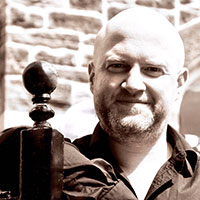
2025 – Ateliér 5

music from the island of Ireland
Choirmaster: Keith Acheson
Arr. Printz: Danny Boy
Stanford: Heraclitus
Arr. Vine: The Ould Lammas Fair
Arr. Greg Gilpin: I'll Tell Me Ma
McGlynn: Geantraí
Arr. Acheson: Chasing Cars
McGlynn: Suantraí
In this atelier we will cover music from the island of Ireland, ranging from the medieval period through to composers living today.
The music will be mainly in four parts (plus some divisi) and will also include some contemporary arrangements of well known Irish folk songs such as Danny Boy, The Parting Glass and The Wild Rover.
Keith Acheson

Keith Acheson is an Irish composer and conductor based in Belfast, Northern Ireland. After obtaining a BMus (Hons) in 1996 he was awarded a PhD in Composition from the Ulster University in 2002.
Along with many pieces for choir, he has had work performed by the likes of the Ulster Orchestra, Gemini Ensemble, HuuJ Ensemble, Arco String Quartet, sopranos Megan Mooney and Anna Gregg and guitarist Brian Keenan.In recent years he has conducted three world premières of his own works, one of which closed the 2023 Belfast International Arts Festival.
He is currently the Musical Director of the Fermanagh Choral Society, the Lindsay Chorale, the Sing for Life and Crescendo Community Choirs and the Belfast Health and Social Care Trust and Citi Belfast staff choirs. Recent highlights with these choirs have ranged from conducting the Irish première of Kim Andre Arnesen’s ‘Requiem for Solace’ with the Fermanagh Choral Society in 2024, as well as the Fauré and Goodall requiems this year, and conducting the Sing for Life Choir in a performance alongside the award-winning and Grammy-nominated group, Celtic Woman.
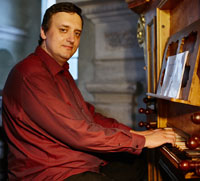
2019 – Ateliér 1

Music of the Austrian convents on the Czech church lofts of the 18. century
Choirmaster: Vít Aschenbrenner
P. Franz Josef Aumann, CanReg. (1728-1797): Missa in C
2015 – Ateliér 1

Sacred compositions of the 18th century
Choirmaster: Vít Aschenbrenner
Czech music archives are full of so far uncovered sacred compositions of the 18th century. We will try to peep into this music repertoire, unknown nowadays, that used to be performed on the choir lofts of both town and village churches mostly in the second half of the 18th century. We cannot, of course, leave out the personality of J.J.Ryba, whose double jubilee we are celebrating this year. Most of the repertoire will be in Latin.
František Xaver Brixi: Sub tuum praesidium in F da Capella, Org.
F.X. Brixi: Sit nomen Domini benedictum in C, Org.
Václav Pichl: Mottetto in D de omni Solemnitate (Ad jubila, ad plausus), 2 Vni, 2 Ob/Fl, Org., 2 Clni
Jiří Ignác Linek: Laudate Dominum omnes gentes in B, 2 Vni, 2 Clni, Va, Org.
J. I. Linek: Regina coeli laetare in C, 2 Vni, Org. 2 Clni
Jan Křtitel Vaňhal: Alleluja in C, 2 Vni, Va, Org., 2 Clni
Josef Antonín Sehling: Dormi nate Theantrope in A, 2 Vni, 2 Cor, Org.
Vít Aschenbrenner

After graduation from the Faculty of Philosophy, Charles University (history, German studies, musicology) he has been working as assistant lecturer in music history and music regionalistics at the Department of Music Culture of the Faculty of Education in Plzeň since 2003. His main field of specialization is, however, music history of South-western Bohemia od the 17th and 18th centuries, with special focus on Klatovy and Plzeň.
Since 1995 he has been organist in St. Ignatius church at Klatovy, in 2014 he was appointed church choirmaster of the Klatovy parish. He studied historical organ and harpsichord playing in the class of R. Hugo (2009-2010), H. Franke (2011) and M. Knoblochová (od 2012). Since 2014 he has been studying conducting in the class of Jiří Štrunc at the Plzeň Music Conservatory. Since 1996 he has been leading the chamber choir Collegium for Sacred Music, that focuses on compositions from regional archives. He also cooperates with the Chamber Orchestra of the Department of Music Culture and has been its leader since 2004. Since 2004 he has also been church choirmaster at Katholische Pfarrei Mariä Himmelfahrt at Bodenmais (D), and since 2010 he has been art director of Niederbayerisches Ärzteorchester at Deggendorf (D).
Since 2007 he has been organizer and dramaturge of the European festival of sacred music „Šumava-Bayerischer Wald“. He is chairman of the west-bohemian area of the Czech Choirs Association. Since 2013 he has been cooperating with the project European Culture Capital Plzeň 2015 (baroque line). In 2014 he organized the Czech part of the international music festival Musica Sacra in cooperation with the Munich Kulturstiftung EUROPAMUSICALE. In 2015 he is, among other things, preparing the world premiere of the Oratorio to the Holy Virgin of Klatovy by the composer Pavel Samiec from Plzeň. The world premiere will take place as part of the celebrations of the 330th anniversary of the Klatovy Marian miracle (1685).
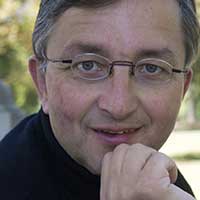
2016 – Ateliér 1

150 years of German baroque music
Choirmaster: Alfons Brandl
Heinrich Schütz: Pater noster
Johann Michael Bach: Ich weiß, dass mein Erlöser lebt
Johann Hermann Schein: Was betrübst Du Dich meine Seele
Johann Pachelbel: Singet dem Herrn
J. S. Bach: Psallite Deo nostro
Johann Pachelbel: Magnificat in D - arr. Alfons Brandl
Alfons Brandl

Alfons Brandl studied music education and choir conducting at Hochschule für Musik und Theater in Munich, and musicology at Ludwig-Maximilians-Universität. Before the end of his studies he had developed growing inclination to solo singing, and therefore followed up with private studies with prof. Margret Langen, and later with Ingrid Bettag.
He has been singing tenor in the world-famous vocal ensemble “Die Singphoniker” for more than 25 years, having participated in many concerts in Germany as well as abroad, he has recorded over 30 CD’s, among others all male choirs by Franz Schubert, which amounts to approx. 100 pieces. He has attached theoretical comments to most of them.
He is no more an active member from July 2008, but he continues his solo performances of ancient music, especially oratories by Bach, Mozart, Haydn and Händel. His repertoire includes also the role of Swan in Orff’s Carmina Burana, that he has performed more than fifty times (among others together with the Symphonieorchester des BR orchestra under the baton of Riccardo Muti.
Last but not least, his recitals include song performances.
Apart from his singing career he also devotes himself to teaching. From 1997 he was associate professor of choir conducting at Hochschule für Musik Nürnberg-Augsburg/Abteilung Augsburg, since 2006 he has been teacher at Hochschule für Musik Nürnberg. That is where he was conferred the degree of professor. From 2009 to 2015 ha was vice-president of this music institution, and from 2001 to 2012 he was member of the Bayerischen Musikrates presiding committee. From 2005 to 2012 he presided the Bayerischer Sängerbund committee, where he has remained active member up to now.
In 1999 he was invited to the 5th World Symposion on Choral Music in Rotterdam, in Summer 2001 he directed the choir studio at the international chamber choir competition in Marktoberdorf. Since January 2002 he has been leading the Augsburger Vokalensemble, and since 2003 also the Kammerchor des Bayerischen Sängerbundes.
As a conductor he worked with the orchestras Münchner Symphoniker, das L‘Orfeo Barockorchester, La Banda, Bayerische Kammerphilharmonie, and others. Alfons Brandl is member of juries at various choir competitions, and also member of the artistic committee and jury of the prestigious competition Deutscher Chorwettbewerb.
Jaroslav Brych
 Jaroslav Brych (1964) has first studied French horn at the Pardubice conservatory of Music in the class of O.Tvrdý, and then conducting at the Academy of Music in Prague in the classes of V.Neumann, J.Veselka and R.Eliška. He has repeatedly taken part in H.Rilling\'s conducting courses in Stuttgart.
During 1984 - 1997 he was the choirmaster of The University Choir at the Charles University (Vysokoškolský umělecký soubor), from 1987 to 1994 he was conducting The Czech Army Symphonic Orchestra (Symfonický orchestr Armády České republiky), and from 1994 to 2005 he was conducting the Prague Philharmonic choir. At present he teaches at the Academy of Music in Prague as well as at the Charles University, Faculty of Pedagogy in Prague and at the Conservatory of Music in Pardubice. He cooperates closely with the Prague Chamber Choir and the Czech National Choir.
He has recorded several CD\'s containing choir pieces (Eben, Martinů, Rachmaninov, Schnittke, etc.). As a conductor he has cooperated with many Czech orchestras (e.g. Symfonický orchestr hl. m. Prahy FOK, Janáčkova filharmonie Ostrava, Komorní filharmonie Pardubice, Severočeská filharmonie Teplice, Praľská komorní filharmonie, etc.) as well as with distinguished orchestras and conductors from all over the world (e.g. Berlin Philharmonic Orchestra, Concertgebouworkestra, Izrael Philharmonic Orchestra, S. Rattle, Z. Mehta, R. Chailly, C. Abbado, F.Welsser-Möst etc.
Jaroslav Brych (1964) has first studied French horn at the Pardubice conservatory of Music in the class of O.Tvrdý, and then conducting at the Academy of Music in Prague in the classes of V.Neumann, J.Veselka and R.Eliška. He has repeatedly taken part in H.Rilling\'s conducting courses in Stuttgart.
During 1984 - 1997 he was the choirmaster of The University Choir at the Charles University (Vysokoškolský umělecký soubor), from 1987 to 1994 he was conducting The Czech Army Symphonic Orchestra (Symfonický orchestr Armády České republiky), and from 1994 to 2005 he was conducting the Prague Philharmonic choir. At present he teaches at the Academy of Music in Prague as well as at the Charles University, Faculty of Pedagogy in Prague and at the Conservatory of Music in Pardubice. He cooperates closely with the Prague Chamber Choir and the Czech National Choir.
He has recorded several CD\'s containing choir pieces (Eben, Martinů, Rachmaninov, Schnittke, etc.). As a conductor he has cooperated with many Czech orchestras (e.g. Symfonický orchestr hl. m. Prahy FOK, Janáčkova filharmonie Ostrava, Komorní filharmonie Pardubice, Severočeská filharmonie Teplice, Praľská komorní filharmonie, etc.) as well as with distinguished orchestras and conductors from all over the world (e.g. Berlin Philharmonic Orchestra, Concertgebouworkestra, Izrael Philharmonic Orchestra, S. Rattle, Z. Mehta, R. Chailly, C. Abbado, F.Welsser-Möst etc.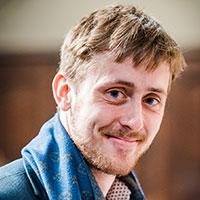
2025 – Ateliér 4

Laudes
Choirmaster: Patrik Buchta
Vladimír Maňas - Confitemini Domino
Vytautas Miškinis - Ubi caritas et amor
Knut Nystedt - Peace I leave with you
Zdeněk Král - Laudate Dominum
Petr Koronthály - Jubilate coeli
Steve Dobrogosz - Kyrie
Accept the invitation to a music studio focused on spiritual choral compositions by contemporary domestic and foreign authors. The main motif is praise - the texts set to music radiate joy and aim to glorify God. For balance and variety, the program also includes compositions of a penitential and supplicatory nature, which give the repertoire a broader emotional dimension. I look forward to meeting you! Patrik
Patrik Buchta

MgA. Patrik Buchta studied choir conducting at the Janáček Academy of Performing Arts in Brno (2017–2023). He is also expanding his education in organ playing at the Brno Conservatory (2020 – present). At the Cyril and Methodius Gymnasium and the Secondary Vocational School of Pedagogy in Brno, he works in the Cantate girls' choir (2017 – present) and at the Institute of Musicology at the Faculty of Arts, Masaryk University, in the mixed choir Ensemble versus (2023 – present), where he focuses on works of contemporary sacred music. He has also collaborated with other choirs: Vach's Choir of Moravian Teachers (2018–2024), the Šlapanice Cathedral Choir (2014–2024), the Czech Choirmaster's Choir, Vox iuvenalis, Choirchestra, Bohemiachor, Schola Brněnské mládeže, and the JAMU Mixed Choir. He has participated in several choirmaster courses led by our and foreign lecturers (Andrea Brown, Václav Luks, Jaroslav Brych, Miriam Němcová, Josef Surovík, etc.). With the Cantate choirs and the Vach Choir of Moravian Teachers, he has successfully participated in several international competitions (e.g. the European Youth Festival in Neerpelt, Belgium, Song Festival in Olomouc, Slovakia Cantat, etc.). In addition to his choirmaster activities, he works as a liturgical organist in the parish of the Assumption of the Virgin Mary in Šlapanice and in the Minorite Church of St. John in Brno.
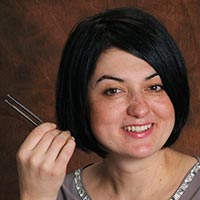
2022 – Ateliér 2

Choirmaster: Natalia Chirilenco
Alexandr Kastalskij: Otče náš
Alexandr Kastalskij: Nyne odpuščaeši
Dmitrij Bortňanskij: Jedinorodnyj Syně
Hreiðar Ingi Thorsteinsson: Rauði Riddarinn
Pentatonix: White Winter Hymnal
arr. Moira Smiley: Bring Me Little Water, Silvy
2012 – Ateliér 2

Eastern inspiration
Choirmaster: Natalia Chirilenco
Zorii seceratorilor (ciocarlia) – Alfred Mendelsohn
Vine hulpe di la munte - arr. Adrian Pop
Lino, Leano –de doi - arr. Nicolae Ursu
С вышних призирая убогия приемля – Александр Архангельский
(The Lord looks from heaven upon the helpless)- Alexander Arkhangelsky (1846-1925)
Господи, спаси благочестивыя - Константин Шведов
(O God, save the pious… ) - Konstantin Shvedov (1886-1954)
«Спаси люди Твоя, Господи» - 3 часть концерта «Тебе Бога хвалим» - Дмитрий Бортнянский
3. part from Concerto Te Deum Laudamus - Dimitri Bortniansky (1751-1825)
In our workshop we are going to go on excursion to eastern music traditions and we will perform the following selected pieces. We will touch a secular carol from northern Romanian area Maramures called Vine hulpe di la munte (A fox will come from the mountains). Then we will focus on the merry folk song Zorii seceratorilor (The morning of sicklemen) and on the love song composed of two contrasting parts Lino, Leano – de doi (Lino Leano – about two), on a slow song Ninge (Snowing) by a Moldovan composer, and on two dynamic and lively Romanian dances. From the Romanian-Moldovan territory we will move even further to the East and we will study two beautiful Russian sacred
Natalia Chirilenco

Natalia Chirilenco comes from Moldova. She studied music lyceum and devoted herself to piano and choir conducting. Later she graduated from the Academy of Music (at a particular time called also University od Arts) in Chisinau (Moldova), majoring in choir conducting. Since 1999 she has been living in the Czech Republic. She received university qualifications certificate at the Janáček Academy of Music in Brno. In 2000 – 2005 she was conducting the mixed choir Schola Cantorum in Prostějov. In 2004 – 2006 she was working with the mixed choir Lumír in Brno. Since 2003 she has been conducting preparatory choirs at the Jaroslav Kvapil Primary Art School in Brno, where she has also been conducting the children’s choir Primavera. At present she is on parental leave.
Leoš Černoušek
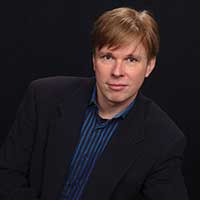
Leoš Černoušek is a piano teacher, choir conductor and producer living in Portland, Oregon.

1989 – Ateliér 1

Josquin des Prez + Giovanni Gabrieli
Choirmaster: Oliver Dohnányi
Josquin des Prez: Tulerunt Dominum meumGiovanni Gabrieli: Plaudite, psallite, jubilate Deo omnis terra
Oliver Dohnányi


2018 – Ateliér 2

Salve Regina - medieval respect to Virgin Mary
Choirmaster: David Eben
Antiphona Salve Regina
Psalmus responsorius Eructavit cor meum
Rondeau Ave mater Salvatoris
Lauda Venite a laudare
Cantio Sanctissima mitissima (2voices.)
Antifona Descendi in ortum
Conductus Salve virgo virginum (3voices.)
The conductor will speak Czech, English and German.
There are not many fields of Christian tradition endowed with so ample and distinctive music repertoire as the cult of Virgin Mary. The medieval songs addressing Virgin Mary are infused with specific poetry and lyricism. Music devoted to Virgin Mary, which is the unifying factor of our workshop, will give us unique opportunity to experience the wide spectre of forms from “classical” Gregorian chants to sacred songs and polyphonic compositions.
2013 – Ateliér 1

Gregorian chant
Choirmaster: David Eben
2008 – Ateliér 1

Choirmaster: David Eben
David Eben

(* 6. 1. 1965 in Prague)
David Eben was born in Prague in 1965. After graduation from clarinet studies at Prague’s conservatory, he took up musicology at the Faculty of Arts of Charles University in Prague. Already during his studies, he specialized in medieval music, mainly in Gregorian chant. In 1991 he graduated from Paris conservatory (Conservatoire Nationale Superieur de Musique de Paris) the program Conducting of Gregorian chant, and in the following year he worked as a conductor of the ensemble Choeur gregorien de Paris. Then he also often visited the Solesmes monastery, a centre of research in Gregorian chant, with the view of studying and consulting.
Besides his scholarly work, David Eben is concentrating on the interpretation of Gregorian chant. In 1987 he founded the vocal ensemble Schola Gregoriana Pragensis (www.gregoriana.cz), which has been intensively recording and giving concerts in almost all European countries, Japan and Israel. The CDs of the ensemble have received a number of awards (Choc du Monde de le Musique, 10 de Repertoire, “Zlata Harmonie” - Golden Harmony Award for the best Czech recording of the year).
Since 1993 he works at the Institute of Musicology of Charles University where he lectures on topics related to Gregorian chant and liturgy. From 2008 to 2013 he worked as professor of Gregorian chant at the University of Lucerne (Switzerland). He regularly tutors in summer courses on theory and practice of Gregorian chant in France, Switzerland and Belgium.
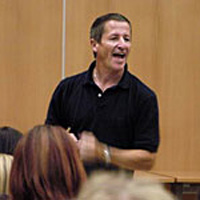
2012 – Ateliér 6

JAZZ
Choirmaster: Urs Ehrenzeller
Every Breath You Take (music & lyrics - Sting), arr. Mark Brymer
Fly Me To The Moon (music & lyrics - Bart Howard), arr. Kirby Shaw
Georgia On My Mind (music -Hoagy Carmichael, words - Stuart Gorrell), arr. Ed Lojeski
Cheek To Cheek (music & lyrics - Irving Berlin), arr. Kirby Shaw
How High The Moon (music - Morgan Lewis, lyrics - Nancy Hamilton), arr. Stephen Zegree
2009 – Ateliér 6

Jazz
Choirmaster: Urs Ehrenzeller
Don't Know WhyWords and Music by Jessie Harris
Arranged by Philip Lawson
Take Five
Words by Dave and Lola Brubeck
Music by Paul Desmond
Arranged by Urs Ehrenzeller
Angel Eyes
Music by Matt Dennis
Words by Earl Brent
Arranged by Urs Ehrenzeller
Sway (Quien Sera)
Words and Music by Pablo Beltran Ruiz
English words by Norman Gimbel
Arranged by Kirby Shaw
Night And Day
Words and Music by Cole Porter
Arranged by Pete Schmutte
2006 – Ateliér 6

Choirmaster: Urs Ehrenzeller
2005 – Ateliér 6

Choirmaster: Urs Ehrenzeller
2003 – Ateliér 4

Choirmaster: Urs Ehrenzeller
1998 – Ateliér 5

Jazz
Choirmaster: Urs Ehrenzeller
1997 – Ateliér 4

Choirmaster: Urs Ehrenzeller
Urs Ehrenzeller – Only YouUrs Ehrenzeller – Ou Happy Day
Urs Ehrenzeller – Autumn Leaves
Urs Ehrenzeller
 Urs Ehrenzeller was born in 1954, and has studied composition, musical pedagogy, and conducting in the Music School in Luzern. Since 1980, he has been a senior lecturer in the same school, where he teaches music theory and listening analysis. He also writes musical arrangements and composes music. He is the conductor of many glees clubs, including the jazz glee club VOCAL TOTAL and the band UPWOOD JUNIORS. Since 1985, he has also been a producer of many recordings that he created in his own music studio.
Urs Ehrenzeller was born in 1954, and has studied composition, musical pedagogy, and conducting in the Music School in Luzern. Since 1980, he has been a senior lecturer in the same school, where he teaches music theory and listening analysis. He also writes musical arrangements and composes music. He is the conductor of many glees clubs, including the jazz glee club VOCAL TOTAL and the band UPWOOD JUNIORS. Since 1985, he has also been a producer of many recordings that he created in his own music studio.Naomi Faran
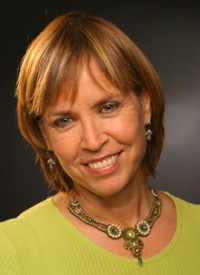
Naomi Faran – Conductor and musical director
Naomi founded the Moran Choir and has remained its conductor and music director ever since. She graduated from Levinsky College of Education and the Conductors course at Tel Aviv University’s Rubin Academy.
She then pursued advanced study of choir conducting at Denmark’s Copenhagen Conservatory and the Malmö Academy of Music in Sweden.
Naomi is regularly invited to give master classes in conducting and workshops at symposia around the world, as well as being in demand as a judge in international competitions, a position she has fulfilled in Slovenia, Denmark, Hong Kong, China, South Korea, Italia, Spain, Argentina and more recently at the Europa Cantat Festival in the Netherlands.
In 1996 Naomi won the Outstanding Conductor award in an international choir competition. From 1992 to 2002 she was appointed by the Ministry of Education and Culture to head a special project to promote and develop children’s and youth choirs in Israel. As part of this she held study workshops for teachers and conductors, taught choirs around the country and strengthened ties between composers and children’s and youth choirs. The year 2002 saw the foundation of the Israeli Center for Vocal Music, the home base of the Moran Choir, at Naomi’s initiative. The Center holds workshops for young singers, conductors, teachers and choirs. A special focus aims to bring the Center’s activities closer to underprivileged communities by conducting joint projects with children suffering from cancer, children at risk and special needs children and adolescents
It is Naomi Faran’s belief that singing is the most natural and profound human expression of all, bridging gaps between individuals, cultures and nations: “We should make sure that the culture of singing is implanted deep within all of us, to make us better, more sensitive people who can contribute more to our surroundings”
She adds that for her: “Conducting means creating a balance between awareness and a flow in real time. Singing is simply being yourself”.
Brian Fentress

Brian Fentress is known for his captivating charisma, powerful vocal ability, phenomenal conducting skills, and inspiring positivity. He hails from Detroit, Michigan, and was born into a family of singers and musicians. At a very young age, his family began to notice his natural music ability. Growing up in church, Brian began directing choirs and singing solos at the age of 5, as a child prodigy in gospel conducting. In high school, Brian was introduced to classical music and developed a passion for singing in the bel canto style. With only two years of classical training, Brian received a full music scholarship to Alabama A&M University. He graduated with honors in 2003 with a Bachelor's degree in Music Business.
In 2005, Brian began traveling throughout Europe conducting gospel music workshops. Concurrently, he went on to continue his education at the University of Phoenix, where he graduated with a Master's degree in Secondary Education in 2006. Brian increased his singing and conducting skills by participating in professional classical and gospel choirs. He continued his education in Poland by completing his doctoral degree at the Academy of Music in Gdańsk, Poland in Artistic Conducting in 2014. Most recently, Brian complete his post-doctoral Habilitation degree in Vocal Performance at the Academy of Music in Łódź in 2020. He continues to work as a professor of music while traveling throughout Europe working as a professional conductor, vocalist, vocal coach, and choir consultant.
Brian's experience as a artist/performer include performing/recording with, and providing support for, award-winning artists such as Aretha Franklin, Lyle Lovett, Cece Winans, Kirk Franklin, Fred Hammond, Israel Houghton, Donnie McClurkin, Hezekiah Walker, Kim Burrell, Mino Cinelu, Zbigniew Wodecki, Maryla Rodowicz, Edyta Górniak, Natalia Kukulska, Marysia Sadowska, Katarzyna Cerekwicka, Mietek Szcześniak, Piotr Cugowski, OZD and TGD. As a producer, Brian has written and produced several projects including Lighthouse LIVE, I Am Regeneration, Gospel Joy LIVE, and Marinate Gospel Choir Live in Prague to name a few. In 2017, he took part in the 8th edition of The Voice of Poland, in which he finished as a finalist.
Brian is dedicated to creating life-changing musical experiences while providing quality instruction for a diverse demographic of singers. You can be sure that you will receive a high quality and uplifting musical experience whenever Brian is present!
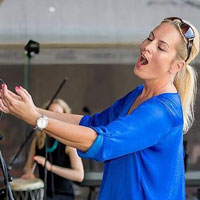
2025 – Ateliér 6

A graceful ride from spirituals to oldies to pop!
Choirmaster: Lucie Freiberg
spiritual, arr. Moses Hogan - Wade in the water
Loreena McKennitt, arr. Joh Washburn - Tango to Evora
arr. Anna Cederberg-Orreteg - Raindrops keep fallin´ down my head
Z. Navarová, arr. David Vaňáč - Andělská
arr. Roger Emerson - We´ll meet again
In this studio, we will embark on a musical journey full of diverse styles and emotions.
We will begin our journey with a spiritual full of energy and hope, with distinctive rhythms and varied dynamics. Then, with cymbals and gentle hand clapping, we will sail through the waves of a sensual and mysterious tango melody. Along the way, a few raindrops may fall on us. However, the rain will be fresh and joyful!
We will find rest with a charming melody with poetic lyrics by Zuzana Navarová, in a fresh and previously unperformed arrangement.
We will then arrive at our destination in an optimistic mood and with wonderful travel experiences!
If you are looking for well-being and adrenaline, you have come to the right place! I look forward to seeing you!
2020 – Ateliér 4

Around the world with a song (mostly modern)
Choirmaster: Lucie Freiberg
William Tell Overture - Gioacchino Rossini / arr. Julie Eschliman
Senzenina - arr. Monde Mdingi, Gerard Wirth
TaReKiTa - Reena Esmail
Angel of the Lord 2 - Prayer, arr. Jakub Kacar
Muie Rendera - Pinto Fonseca
Let's fly through several continents and taste the music of diverse cultures, languages and emotions; traditional one, but mostly in a more modern version.
Singing is the voice of our hearts, so let them sing together with the joy and enthusiasm.
In this atelier we will turn the energy and emotions of individual compositions into delicious tones, but also into movements, so that the result brings lightness and pleasure to the choir and listeners.
Lucie Freiberg

She started her professional career in the opera choir of the F.X Šalda Theater in Liberec, where she also performed her first small solo roles. Intensive study of singing led her to the National Theater ensemble in Prague, which brought her further professional experience. Since 1997 she also studied singing in Australia and subsequently in the USA.
Studying music at Oakland University and the University of Michigan has allowed her to study with the world's most important musicians and perform in a variety of opera and musical performances. She graduated from conducting under the leadership of Dr. Mike Mitchell and singing with Dr. Edith Diggory.
During her years in the United States, Lucie has also worked as a vocal soloist, private singing instructor and music school manager in Michigan. In 2006 she returned to the Czech Republic. Since 2010 she has started to cooperate with various ensembles as a voice coach and lecturer.
In early 2011, Lucie founded her own project, the Prague mixed choir Lucky Voice Band. Since its inception, it has grown substantially and has won several awards in various competitions.
In 2012-13 she took over the leadership of the Ignis Church Choir in Prague and from 2015 also the chamber choir Myšmaš.
At present, Lucie is mainly involved in the Musica Orbis Prague Festival, cooperates with various American singing ensembles and gives private singing lessons.

2023 – Ateliér 2

Carpathian Songs - women's atelier
Choirmaster: Jurij Galatenko
Jaroslav Dostalík "Songs of St. John"
Jan Vičar "Konopa"
Jiří Pospišil "Dybych byla jahodú"
Ihor Šamo "Divyč-Večir"
Ukrainian folk "Plyne kacha po Tysyni" (Picardy Tertian)
Do you enjoy musical variations of the contemporary approach to folk motifs? Do you like (post)border situations? Do you like the variability of folk song, playful musical architecture? And in general...do you like to play ?
Come and see that music has no boundaries in time or space....
All the musical motifs of the KARPATSKÉ ZPJEVANKY studio are set in the Carpathian region.
The intonations are broken by syncopations, mirroring the mountain peaks of the Carpathians and contrasting the picturesque melodies of the valleys below. We offer playful elements stretching across the mountains of Slovakia to Ukraine, colourful motifs from the Slovakian borderlands, or picturesque waves of melodies from the Moravian region.
Regional songs tell their stories set deep in the Slavic land. With their mystical language and depth of musical rendering, they recall ancient pagan customs. Their sung variations allow us to return to our roots and recall times long past, tied to our ancestors, and enable us to connect the past with the present....is this not the mission of the musical arts?
2014 – Ateliér 3

Slavonic 'vyshivanka'
Choirmaster: Jurij Galatenko
Slavonic (+Hungarian) folk motives for female voices
Igor Naumovych Shamo (1925-1982): "Vesnyanka"
Igor Fyodorovich Stravinsky (1882-1971): "Podbludnye"
Béla Bartók (1881-1945): "Ne hagyj itt", "Legényosúfoló"
Bulgarian folk song: "Sbrali se sa sbrali"
Todor Skalovski (1909-2004): "Macedonian humoresque"
2010 – Ateliér 2

Stage choir music
Choirmaster: Jurij Galatenko
Georg Friedrich Händel (1685-1759): oratorio Messiah (Messiah - 1742 - HWV 56) – HallelujahBedřich Smetana (1824-1884): Prodaná nevěsta (The Bartered Bride / opening choir „Proč bychom se netěšili“ – “Why not be merry”)
Giuseppe Verdi (1813-1901): Nabucco (Chorus of the Hebrew Slaves)
Wolfgang Amadeus Mozart (1756-1791): Requiem (Lacrymosa)
Antonín Dvořák (1841-1904): opera Dimitri (1882/1894 – scene 5 – „Hle, vzešlo zlaté slunce“ – “The golden sun has come out”)
Jurij Galatenko

was born in 1964 in Kiev. He graduated from the Kiev State Conservatory majoring in choir conducting. At the end of 1980s and at the beginning of 1990s he conducted the choir of the Kiev Polytechnical Institute. He was also singer in the choir of the Kiev theatre. In 1995 he graduated from the Ukrainian National Academy of Music majoring in opera and symphony conducting. In 1995-1997 he was visiting conductor of the Cernigov State Philharmonic Chamber Orchestra, in 1997-1998 he conducted the Rivne State Philharmonic Chamber Orchestra.
In 1998 he became assistant choirmaster and in 2000 chief choirmaster in the National Moravian-Silesian Theatre in Ostrava. He has studied plenty of important musical dramatic pieces with the theatre choir. He has also cooperated with Janáček Philharmonic Orchestra Ostrava and with other bodies; he has been choirmaster and conductor at festivals and on stages abroad.
As for his teaching experience, he was outside teacher of choir conducting and music theory at the Kiev conservatory in 1991-1995; and since 2000 he has been outside teacher at the Music Education Department at the Ostrava University (he teaches choir conducting, orchestra conducting, score reading, music theory for choirmasters). He is art director and choirmaster of the Ostrava Lady Teachers Choir that gained many awards and prices at international competitions and festivals (2003 – Olomouc, 2006 – Debrecen, 2008 – Praga Cantat, 2009 – Canti Veris Praha etc.)

2018 – Ateliér 5

Word from travels
Choirmasters: Michal Hájek, Radim Zenkl
Aj, dobre je (folk song, arr. Michal Hájek)
V hoře (Radůza, arr. Michal Hájek)
Ayibobo (folk song from Haiti, arr. Sten Källman)
Revival (Radim Zenkl – author's composition for mandola and choir)
Každý si nese své břímě (Jarek Nohavica, arr. Michal Hájek)
Marie (Zuzana Navarová, arr. Dana Houdková/Michal Hájek)
The conductor will speak Czech and English.
Dear song-people,
Our workshop is meant for those who are – apart from regular work in choir – not afraid to experiment, improvise, and throw away sheet music and sing between the lines. It means singers who have itchy feet, and fancy jumping into the unexplored ocean of music and exploring its backwaters. We ourselves do not know how this all will turn out, because we might arrive at dead end. We, however, are tempted to taste the power of our precious gathering and joint discovering. We will avoid neither a bit of roister, nor a bit of emotion.
The workshop will be conducted by Michal Hájek, and visited by Radim Zenkl, who will embellish our performance with his multi-instrumental magic.
We will be honoured for at least the short time at Bohemia Cantat to link our ways with yours!
With heartiest greetings,
Michal Hájek and Radim Zenkl
2013 – Ateliér 3

On a sailing ship to unknown lands
Choirmaster: Michal Hájek
Ale Möller (arr.): Trilo (Scandinavia)
Sten Källman (arr.): Papa Loko (Haiti)
James Whitbourn: Introit
Fläskkvartetten: Walk (arr. Simon Ljungman)
What is more difficult – to set out to sea and sail to unknown lands, or to be waiting on the shore for a close person to come back? The workshop is ready for courageous choir explorers who stop at neither of these. The programme will consist of contemporary choir music composed during the last fifteen years, both original pieces, and modern arrangements of traditional melodies. The workshop programme will be knitted into a seamless music unit, decorated with invited percussionists and wind instrument players.
2010 – Ateliér 4

North wind
Choirmaster: Michal Hájek
The workshop is ready for all who would like to taste a selection of delicacies from the Scandinavian choir music plate. You can have cold or hot meals, both sweet and bitter, playful as well as horrifying, in any case, however, aiming at hitting the singers and their audience. The supposed output will be a compact unit comprising the participation of percussion instruments and choir improvisation. It will be concentrated around a mini cantata Warning to the Rich containing a strong biblical message.
Gunnar Eriksson (arr.): To The Mothers in Brazil/Salve Regina
The little instrumental piece To The Mothers in Brazil used to be performed by its author – the jazz pianist Lars Jansson – from time to time with his trio. Later it captivated the well known choir arranger Gunnar Eriksson and he gave it its choir form, thus creating one of the most popular pieces of the northern choir production.
Sven-David Sandström: To see the World
A visionary text of the romantic poet by William Blake („To see a world in a grain of sand “) and the choir magician Sven-David Sandström’s sense of composition gave rise to this remarkable meditative sound snack.
Thomas Jennefelt: Warning to the Rich
Mini cantata written by the guru of the contemporary Swedish choir music Thomas Jennefelt based on the text of the biblical book Jacob takes satirical aim at self-satisfied people collecting properties.
Michal Hájek

Michal Hájek was born in Hustopeče in 1982. His first steps in music lead to the piano. In 2003 he graduated from the Prague Conservatory in the class of Prof. Eva Boguniová. He also studied conducting at the Prague Conservatory, his teachers were Miriam Němcová, Hynek Farkač and Miroslav Košler. In 2007 he earned a bachelor’s degree at Charles University in Prague majoring in church music conducting. In 2012 he finished his studies of conducting at the Academy of Performing Arts in Prague.
Michal Hájek worked as a répétiteur for the ballet in the National Theatre, as an assistant choirmaster in the Prague Philharmony Choir, he also conducted the Prague Mixed Choir and the Mixed Choir Jasoň. He attended choirmaster courses lead by Johannes Prinz, Ragnar Rasmussen, Anders Eby, Tonu Kaljuste and Gustav Sjökvist. In 2011 he won an international conducting competition in Budapest. He is choirmaster of Bohemiachor, and of the vocal ensemble Oktet, together with Sylva Mafková. With both these ensembles he has won both Czech and international competitions. Apart from classical programmes he has presented a number of inter-genre projects.
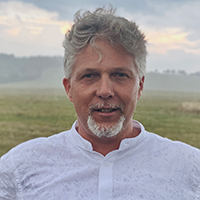
2023 – Ateliér 4

Czechoslovak folk songs and pop in their own brine
Choirmaster: Luboš Hána
Jindřich Brabec - Motlitba pro Martu
David Stypka - O lítání
Petr Ostrouchov - Jednou
arr. Luboš Hána - Čerešničky
Vašo Patejdl - Čakám ťa láska
Vlasta Redl - Co když
Bohuslav Ondráček - Bílé, mám tě rád
For this year's Bohemka I would like to bring again some of my choral arrangements, which will be tailored to our studio. Whether it will be as in 2018 dedicated only to folk songs, or whether some "pop" will be mixed in, I don't know yet. Either way, modern harmonies and seductive dance rhythms should be their common denominator.
Expected parts:
1. Intro
2. Pragmatic about life
3. About the search and ... the search
4. One whimsical
5. Another brooding one
6. In the whirl of the dance
2018 – Ateliér 6

Czechoslovak folk songs pickled in pop
Choirmaster: Luboš Hána
Aj hory, hory
Ha, ty svatý Vavřenečku
Na tom Bošileckým mostku
Horo, horo hor
Týnom, tánom
The conductor will speak Czech and English.
This year I intend to bring to Bohemia Cantat Czech, Slovak and Moravian folk songs wrapped in the array of contemporary pop music. You may tell yourselves in August if the result is a cup of pop, or a cup of folk.
2014 – Ateliér 6

Pretty little jazz and pop, or check it in Slovak and Czech
Choirmaster: Luboš Hána
Arr: Luboš Hána (*1973): Original arrangements of Czech and Slovak pop (Olympic, Elán, Suchý – Šlitr, Mládek…)
Czechoslovak hits in their own juice. The arrangements or even medleys are still slowly maturing in Sibelius’ brine, and will need some fresh Liberec breeze to achieve final taste. Only then Starci na chmelu, Elán, Olympic, Mládek or Suchý and Šlitr can reach full and choir-balanced flavor.
2012 – Ateliér 5

MUSICA MODERNICA
Choirmaster: Luboš Hána
The workshop is intended for singers who want to take pleasure in singing Czech, as well as worldwide, evergreens of the second half of the 20th century in unconventional choir arrangements. .
Mixture of songs by Suchý and Šlitr
Mixture of evergreens by Ivan Mládek
T. Hutch / J. Štaidl: Pátá (orig. "Downtown" an international hit by Petula Clark)
Selection of songs from Czech music film
2010 – Ateliér 5

Jazz
Choirmaster: Luboš Hána
Paris Rutherford – Wake Up
Kirby Shaw – It´s a Bepop
Kirby Shaw – Sing Me a Swing Song
Luboš Hána – Mixture of songs by Josef Kainar
2008 – Ateliér 6

Choirmaster: Luboš Hána
Luboš Hána

Luboš Hána (* 1973) was "bred" by the Ústían Faculty of Education, where Prof. Tomáš Fiala and Prof. Jiří Holubec tried to instil good choral manners in him. For more than twenty years he has been trying to share with students his experiences with music gained at various choral competitions, workshops, festivals and projects. Despite his warm relationship to classical choral music, it is always in the end popular music that is characteristic of the choirs he works with (VENTILKY Chamber Choir - ZUŠ Jirkov, NONA Chamber Choir - PF UJEP Ústí nad Labem). He is the spiritual father of the Jirkovský Písňovar choral festival, which is focused (how else...) on popular music.

2016 – Ateliér 3

Joy Forever
Choirmaster: Jiří Holubec
2009 – Ateliér 5

Musical
Choirmaster: Jiří Holubec
Juno and Avos - the rock opera (composer Alexey Rybnikov) - Orthodox chorus "Gospodi, uslyši mňa", Final chorus "Aleluja"West Side Story (composer Leonard Bernstein) - choruses
Jiří Holubec

JIŘÍ HOLUBEC was born in 1959. He graduated from the Faculty of Pedagogy in Ústí nad Labem, specializing on choir conducting under the leading of Prof. Tomáš Fiala. Later he studied music theory at the Music faculty of the Academy of Arts in Prague. In 2002 he obtained doctor´s degree there. Since 1984 he has been teaching music education at the Faculty of Pedagogy in Ústí nad Labem. He is member of the academic council at the Music Theory Institution of the Academy of Arts in Prague. In 2007 he was appointed as a university professor.
He was choirmaster of the Faculty of Pedagogy Mixed Choir in Ústí nad Labem. In 1989 he set up - together with prof. Josef Říha - the university choir Chorea academia, in 1993 he became choirmaster of the Děčín choir. He worked as choirmaster also in Mannheim in Germany and at the conservatory in Teplice. He is artistic director and arranger of Bigband Bonit.
He participated in concerts and festivals in most European countries and in the USA, where he conducted the Chorea Academica choir during its debut in 1996. In 2004 he conducted the choir of the sbor State University of New York in Cortland and performed and premiered pieces by both Czech and foreign composers. He works also as a composer and arranger, he taught arranging at the Charles University in Prague.
In 2003 he became director of the International Symposium of choir singing Cantus choralis, organized regularly by the university in Ústí nad Labem. He is member of the preparatory committee of the International Symposium Cantus choralis Slovaca that takes place at the Matej Belo University in Banská Bystrica.

2010 – Ateliér 1

Ancient music
Choirmaster: Robert Hugo
Johann Sebastian Bach (1685-1750): Motet „Jesu meine Freude" (BWV 227) - selectionFelix Mendelssohn Bartholdy (1809-1847): Motet "Ehre sei Gott in der Höhe"
Robert Hugo

Robert Hugo has been considered an expert in the 17th century Czech music already for years. His personality is a combination of interpretation artistry (he is a soloist and a conductor), deep theoretical knowledge and almost twelve-year practice in reconstructing old manuscripts that resulted in a number of new premieres of pieces by old masters.
R.H. has begun his professional music career after graduating from the Faculty of Science of the Charles University in Prague. He finished his music theory studies at the Faculty of Music of the Academy of Performing Arts in Prague, where he was at the same time studying organ in the classes of Prof. Milan Šlechta and Prof. Jaroslav Tůma. He also studied harpsichord as a pupil of Helmut Franke and John Toll. His most important teachers of ancient music are on his opinion Marcin Szczycinsky, the art director of the ensemble Bornus Consort Warszawa, and Dr. Holger Eichhorn, the founder and art director of the ensemble Musicalische Compagney Berlin.
Since 1991 Robert Hugo has worked as organist in the University church of St. Salvator in Klementinum in Prague. He regularly teaches at the Ancient Music Summer School in Valtice. He lectures on music theory at the Sacred Music University in Görlitz.
R. H. has cooperated with renowned ensembles such as Musicalische Compagney Berlin, Pro Cantione Antiqua London, Bornus Consort Warszawa, and soloists such as Magdalena Kožená, Simon Standage or Jiří Stivín. He has been a conductor in the Janáček Theatre in Brno. As a soloist he specializes in historical organs and South German keyboard instruments. He gives concerts in many European countries - most of all in the Czech Republic, in Germany and in Poland.
Robert Hugo is well-known for his research on the field of Czech and southern German music. He lectures and publishes his works. His activity has culminated in a number of discoveries and new premieres of pieces by baroque masters, such as J.D.Zelenka, G.Carissimi and Adam Michna.
Marko Ivanovič
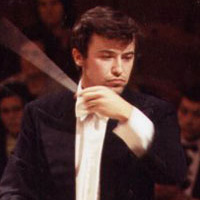 Marko Ivanovič was born in Prague, but spent childhood in former Yugoslavia. He came back to the Czech Republic at the age of 15. He studied conducting and composition at the Prague Conservatory of Music (1993-97) and at the Academy of Music Arts (1998-2003). In 1999 he stayed in Utrecht in Holland during a short-term scholarship attachment specialized in composition. At present he is a graduant at the department of composition of the Academy of Music Arts in Prague.
Marko Ivanovič was born in Prague, but spent childhood in former Yugoslavia. He came back to the Czech Republic at the age of 15. He studied conducting and composition at the Prague Conservatory of Music (1993-97) and at the Academy of Music Arts (1998-2003). In 1999 he stayed in Utrecht in Holland during a short-term scholarship attachment specialized in composition. At present he is a graduant at the department of composition of the Academy of Music Arts in Prague.
He has worked with many Czech as well as foreign orchestras. In 1996 he set up Malostranský komorní sbor (The Prague Lesser Town Chamber Choir), he also participated in setting up and is conducting Pocket Opera Prague. Since 2006 he has been conductor in the National Theatre. At present he also conducts the Czech Student Orchestra which has been - for two years already - giving a cycle of concerts for young people Four Steps into the New World.
His pieces are performed at many concerts and festivals at home as well as abroad, he frequently composes music for theatre, film or radio plays. Many of them have been recorded by the Czech or foreign radio stations.
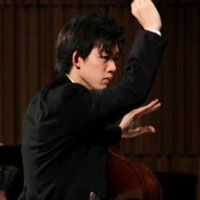
2013 – Ateliér 4

Japanese choir music
Choirmaster: Chuhei Iwasaki
Michio Mamiya: 12 Inventions (selection)
Hikaru Hayashi: Japanese Lyrical Songs (selection)
Akira Miyoshi: 5 Japanese Folk Songs (selection)
You will sing Japanese folk songs as well as contemporary pieces under the direction of a Japanese conductor.
Chuhei Iwasaki

Chuhei Iwasaki was born in 1987 in Tokio. He graduated from the Conservatory Toho gakuen in Tokio and now he is studying at the Prague Conservatory in the classes of prof. M. Košler and M. Němcová. From October 2013 he will study at the Academy of Performing Arts in Prague.
He has cooperated with The Museum of Antonín Dvořák, with Czech Television, with the boys’ choir Pueri Gaudentes and with Václav Havel’s foundation Vize 97.
In 2010 je set up the student ensemble Young Chamber Orchestra Prague, and since 2011 he has been chairman of the jury at the international choir competition Praga Cantat.
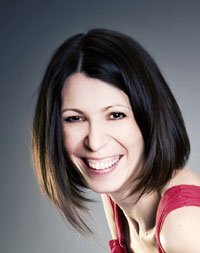
2022 – Ateliér 5

Roots of musicals II.
Choirmaster: Zuzana Kadlčíková
2019 – Ateliér 5

Roots of musicals
Choirmaster: Zuzana Kadlčíková
Dobře placená procházka - Jiří Suchý, Jiří Šlitr
- Haleluja
Johanka z Arku - Ondřej Soukup, Gabriela Osvaldová & Jiří Hubač
- Veni, creator spiritus,
- Ty jsi ten déšť
West side story - Leonard Bernstein, Stephen Sondheim
- Tonight
- One hand, One heart
- America
Jesus Christ Superstar - Andrew Lloyd Webber, Tim Rice
- Poslední večeře
- Psát od prvních řádků
- Hosanna
Hair - Galt MacDermot, Gerome Ragni & James Rado
- Aquarius
- Manchester
- Hair
- Let the sunshine in
Zuzana Kadlčíková

Zuzana Kadlčíková is one of the distinctive young choirmasters in the Czech Republic. She gained the essential choir experience in the Jitro Children's Choir (Prof. Jiří Skopal) in Hradec Králové. She graduated from the Faculty of Education of the University of Ostrava (music teacher and choirmaster for the Secondary Schools) and the Janáček Academy of Performing Arts in Brno (choirmaster and conductor). As a conductor she participated in many projects with the JAMU Chamber Opera and finished her studies by the performance of Eugene Onegin by P. I. Tchaikovsky.
She was a member of the Adash ensemble (doc. Tomáš Novotný) and worked as a corepetitor at the opera of the Antonín Dvořák Theater and at the Moravian Theater Olomouc. She received a scholarship at master conductor courses at Internationale Sommerakademie Reichenau in Austria.
As a choirmaster of the children and youth choir at the Brno Philharmonic, Kantiléna, she received the highest prize (Summa Cum Laude) at the choral competition in Neerpelt 2006. She also acted as a choirmaster and artistic director of the mixed choir Virtuosi di Mikulov, with whom she recorded several CDs of the world choral repertoire. She organized the International Choral Festival Kampanila in Mikulov as a dramaturgist.
She was awarded the Junior Choirmaster Award and founded the choir Ensemble Forte in Brno. She is regularly invited to the jury of various choral competitions.
In 2013 she debuted as a conductor at the Brno National Theater with the opera Dream of the Midsummer Night (B. Britten). In 2016–2018, she was the choirmaster of the Ars Brunensis Chorus in Brno, with which she won the 1st Prize at the A. Tučapský Festival (2017). For the last three years she has been working as a corepetitor at Brno City Theater, where she rehearses exclusively the musical repertoire. Since 2018 she has been an assistant to the choirmaster of the Czech Philharmonic Choir Brno. She privately teaches singing and improvisation.
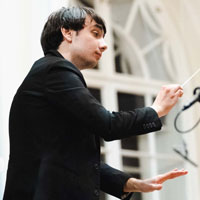
2024 – Ateliér 4

Around the world in 20 minutes
Choirmasters: Igor Karpilovskij, Jaroslav Šindler
Swedish folk - Trilo / Slängpolska efter Byss-Kalle
Haitian folk, arr. Sten Källman / Sten Källman - Papa loko / Rara papiyon
Xhosa folk, arr. Michael Barrett, Ralf Schmitt - Indodana
Bulgarian folk, arr. Khristo Todorov - Svatba
Moravian folk - Ej, jedeme, jedeme
We invite all lovers of musical travel to join us on a sing-along adventure with two wacky guides. A tour full of laughter, touching, rhythmic swaying and, most importantly, general partying awaits us!
Our itinerary will include lesser-known folk songs from different parts of the world in special "bohemian" arrangements.
Igor and Jaroušek are looking forward to seeing you!
Igor Karpilovskij

Igor Karpilovsky studied conducting at the Brno Conservatoire under Stanislav Kummer. In practice he focuses mainly on choirs. In Brno he has worked with the Primavera children's choir and the mixed choirs Choirchestra and Gaudeamus.
He is currently studying conducting at the Academy of Performing Arts in Prague (among others under the pedagogical guidance of N. Baxa, T. Koutník and L. Vasilko) and works as a singer or choirmaster in several Prague choirs, including the Kühn Mixed Choir. He is also a member and one of the permanent choirmasters of the national choir Bohemiachor and since September 2022 he has been leading the Prague choir Punkt, which focuses on contemporary music. During his studies at the Academy of Performing Arts in Prague he collaborated with the Hradec Králové Philharmonic, the North Bohemian Philharmonic Teplice and the Martinů Voices chamber choir. He spent the winter semester 2023-24 in Vienna as part of the Erasmus+ programme at the Universität für Musik und darstellende Kunst Wien, where he studied choral conducting with the renowned Austrian choral conductor Alois Glaßner.
In November 2023, he conducted the brass orchestra of the Music of the Castle Guard and the Police of the Czech Republic and in January 2024 he won the first prize in the category of conducting students at a competitive conducting showcase organised by the Karlovy Vary Symphony Orchestra. In February 2024 he performed his Bachelor's Concert at HAMU with the Orchestra of the Academic Chamber Soloists and members of the Kühn Mixed Choir. Since March 2024 he has been working as an assistant conductor with the Liberec F. X. Šalda.
Jan Kasal

Ida Kellarová
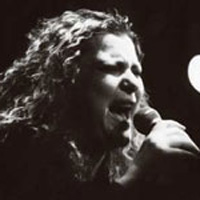 She comes from a Gypsy-Moravan family
She comes from a Gypsy-Moravan family
Her father, Koloman Bitto, was an outstanding and very well known Gypsy musician. After graduation from Janáčkova Music Academy in Brno, she started performing in Na Provázku Theatre.
In 1982 she moved to Wales, where she started giving concerts and later teaching Gypsy songs.
Everybody can sing! There is an unbelievable power in each of us and singing can release this power, says Ida, and her singing doesnt let anybody hesitate about her words.
In 1995 she returned home for good and settled down in Bystré in Českomoravská vysočina. She founded International School of Human Voice there and she continues with the work she started in Wales. Her courses are inspired by her own experience and her eastern, gypsy origin. Several documentary films have already been made about her work. In 1998, she and her partner Desiderius Duľda founded a Gypsy music group called Romano Rat (Gypsy Blood), which gives concerts all over the world.
Source: www.kelarova.com

2003 – Ateliér 1

Choirmaster: Jiří Kolář
1999 – Ateliér 3

Bohuslav Martinů - Opening of wells
Choirmaster: Jiří Kolář
Bohuslav Martinů – Otvírání studánek
1997 – Ateliér 3

Choirmaster: Jiří Kolář
P. Eben – AntifonaZ. Kodály – Veni, veni, Emmanuel
G. Deak-Bardos – Eli, Eli
Laburda – Missa sistina
1992 – Ateliér 1

Z. Lukáš ? Missa brevis
Choirmaster: Jiří Kolář
Zdeněk Lukáš – Missa brevis
Jiří Kolář

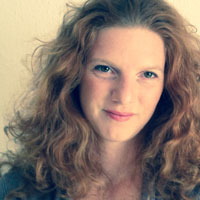
2024 – Ateliér 5

Body & Soul
Choirmaster: Dita Kosmáková
Charlie Puth - One Call Away
arr. Moira Smiley - Bring Me Little Water, Sylvie
Erik Bosio - 224
Peter Gabriel - Washing of the Water
As the name of the studio subtly suggests, we will try not only to feed, but also to engage the body and soul. (The reward is, of course, that deep musical experience that will warm you on the way to the next choir rehearsal.
Popular music never ceases to teach and fascinate me, and so I firmly hope to meet again some equally spirited daredevils.
P.S. Please take the physical component literally, so equip your travelling bag with loose and comfortable clothing.
2015 – Ateliér 6

Jazz and pop
Choirmaster: Dita Kosmáková
Dear lovers and friends of rhythmic singing!!
I am looking forward to seeing you again, as well as new curious people, in my workshop.
You can expect MOVEMENT (simple) + RHYTHM (expressive) + CONSONANCE (interesting)
The password is simple:
Leave vibrato at home! :-)
2013 – Ateliér 6

Jazz & Pop
Choirmaster: Dita Kosmáková
Kirby Shaw (arr.): When I Fall In Love
Rammstein, Jan Bürger & Oliver Gies (arr.): Engel
Martin Carbow (arr.): Pressure down
Charlie Chaplin, Steve Zegree(arr.): Smile
Greg Jasperse (arr.): Voice dance
Jens Johansen (arr.): Viva la Vida
Expect an exciting journey to a world full of new sounds free of Central European choir conventions. Our goal is bold choir sound joined with fascinating rhythm. Let yourselves be seduced by beautiful, even demanding a capella arrangements by real masters of this genre:
When I Fall In Love – beautiful ballad belonging to jazz standards with a short solo part
Pressure down– with extraordinary emphasis on rhythm and groove: “Rhythm is it!”
Engel – one of the most popular German arrangements by the band Maybebop: Bach meets Rammstein! ?
Smile – short, but charming piece characterized by so-called “close harmony” – and thus, nonetheless, a bit more difficult
Voice dance* - pure joy of singing, the name itself is a programme here
Viva la Vida* - Vocal Line is – not by mere chance – one of the most successful choirs, constantly surprising with fantastic arrangements by Jense Johansen
I am looking forward to you!
Dita Kosmáková

Born in 1982; singer, teacher and conductor.
Initially, she studied the recorder at the Teplice conservatory, and at the same time she frequented the J. E. Purkyně University in Ústí nad Labem, where she studied music didactics. She finished her studies in Dortmund, where she focused on solo singing and conducting. She further specialised in choral vocal tutoring, especially concerning dynamics, timbre and accurate interpretation of the style of various musical periods. The core of her interest is jazz and popular music; in 2011, she studied at Glen Bushmann’s Jazz Academy in Dortmund and took courses in rhythmical music conducting (Matthias Becker, Martin Carbow, Roger Treece, Jens Johansen). In 2014, she finished her 3-year studies at the Complete Vocal Institute in Copenhagen, thus becoming the first Czech music teacher to receive CVT certification.
During her studies, she began working as the vocal counsellor and conductor of the Dortmund University Choir and participated in international projects, e.g. “Campus Cantat”. At present she conducts the “Hebbboppers“ jazz choir under the Dortmund University (where she has begun her graduation studies in musicology), she works as an international CVT Coach and is a member of the German a capella groups “Stimmrecht“ and “Cayenne“.
Branislav Kostka
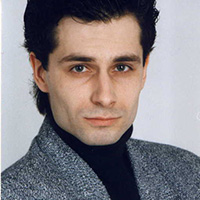

2022 – Ateliér 4

Bluegrass
Choirmasters: Kamila Zenklová, Radim Zenkl, Ondra Kozák
In the Pines (American traditional)
Beautiful Life (William M. Golden)
Body and Soul (Virginia Staufer)
This Heart of Mine (Steven F. Brines, Jim Smoak)
Rocky Top (Felice and Boudleaux Bryant)
Thirsty in the Rain (Peter Rowan)
A vocal cross-section of bluegrass history from its beginnings in the mountain music of the Appalachian Mountains, through the influences of English, Irish and Scottish traditional songs, blues, gospel to contemporary styles. The term bluegrass as a musical style is derived from the name of the band Bluegrass Boys, which was founded in 1939 in Kentucky by Bill Monroe, inspired by the name of their state plant, Kentucky Bluegrass (Poa pratensis), a bluish prairie grass.
Bill Monroe is considered the father of bluegrass. More than 150 musicians played in his band Bluegrass Boys during its existence, many of whom then continued with their own bluegrass bands. It is remarkable that bluegrass is very popular in the Czech Republic, probably following the tradition of Czech unique 'tramp music' and country music.
Bluegrass will be heard for the first time in the Bohemia Cantat studios. Most of the songs will be accompanied by Radim, Ondra and other guest players on typical bluegrass instruments, such as guitar, mandolin, banjo, violin, dobro and bass. A rich variety of songs awaits us, from the traditional bluegrass roots through the heartfelt ballads to the songs at captivating tempos, where we will feel the uplifting energy known as 'bluegrass drive'.
Radim Zenkl & Ondra Kozák
Czech-American Radim Zenkl founded this musical duo with Ondra Kozák as his European concert project. Listeners can look forward to tunes and songs from both players' own works, supplemented by bluegrass, swing, Celtic and 'world music' traditionals in special arrangements. They will perform at the Bohemia Cantat's concert on Friday in the first part of the program.
zenklkozak.com
facebook.com/zenklkozak
instagram.com/zenklkozak
Ondra Kozák

is a singer, multi-instrumentalist (guitar, violin, mandolin, bass, dobro), composer, lecturer, music director and organizer of music courses. He focuses mainly on acoustic music: bluegrass, folk, new acoustic. As a guitarist, he recorded two solo records (Ataman, 2014; Overtones, 2019) and won the title 'Guitarist of the Year' 5 times in the Poll of the Bluegrass Association of the Czech Republic. He has participated on more than 20 studio albums. As a singer and player with various groups, he won four times the prestigious European Band of the Year competition at the French La Roche Bluegrass Festival. He collaborated with important personalities of the world music scene, such as Mike Marshall, Dan Crary, Tony Furtado, Beppe Gambetta, Dale Ann Bradley, Steve Gulley, Cia Cherryholmes and Mike Compton among others.
Ondra is a sought-after lecturer and organizer of music courses. In most of them, he focuses on music theory and building of harmony vocals, emphasizing the practical use of the information obtained. The program includes rehearsals of joint songs, band coaching of smaller groups of participants and evening concerts. He had taught four times at the 'Gill's vocal workshop', where they focused directly on singing and everything related to it in the bluegrass, folk and country genres, such as basics of harmony, building, writing and rehearsal of three-part and four-part harmony singing, ear training and rhythmic exercises, vocal technique and warm ups, repertoire selection, phrasing, stage presence, analysis of selected recordings, etc.
Ondra is an author of several educational publications, he writes articles for musicians in his blog, and regularly creates content for his own educational platform 'ATAmusic online workshop'. He also records and publishes the 'ATAmusic Podcast' - Czech audio series for musicians.
Web, blog, music projects: www.ondrakozak.com
ATAmusic online workshop: www.atamusic.eu
Facebook: www.fb.me/ondra.kozak
Instagram: www.instagram.com/ondrakozak2
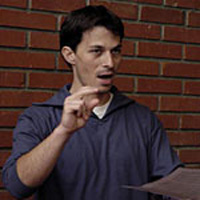
2005 – Ateliér 4

SPIRITUAL A GOSPEL
Choirmaster: Jiří Kožnar
Nobody Knows The Trouble I Have Seen (Arrangement: Rolf Mammel)He Never Failed Me Yet (Arrangement: Ray Robert)
All My Trials (Arrangement: Norman Luboff)
Jesus Oh What A Wonderful Child (Arrangement: Jiří Kožnar)
2003 – Ateliér 2

Choirmaster: Jiří Kožnar
2001 – Ateliér 2

Fugue in three stylistic epochs
Choirmaster: Jiří Kožnar
B. M. Černohorský - Quem lapidaverunt
J. Haydn - Theresienmesse
E. Toch: Fugae aus der Geographie für sprechenden Chor
1999 – Ateliér 4

South American music for mixed choir
Choirmaster: Jiří Kožnar
A. Ramirez – Salmo 150
1998 – Ateliér 2

Choirmaster: Jiří Kožnar
J. D. Zelenka - Caligaverunt oculi meiJ. Pachelbel - Singet dem Herm
D. Scarlatti - Exultate Deo
Jiří Kožnar


2015 – Ateliér 2

... impossible without us ...
Choirmaster: Jiří Kratochvíl
In this year’s women’s choir workshop we will look forward to a mosaic that will satisfy everybody. We will sing masterpieces inspired by Gregorian chant and renaissance cori spezzati, represented by Biebl’s double choir Ave Maria, folk music (selection of Bulgarian folklore), tango (Astor Piazzolla) and Negro spiritual arranged by Moses Hogan.
Ave Maria - a famous composition for women’s double choir by Franz Biebl 1964
Ubi Caritas - a piece by the contemporary Norwegian composer Ola Gjeilo from 2007
Liber tango - tango transcription by Astor Piazzolla
Ride on King Jesus - spiritual arranged by Moses Hogan
Wedding - Bulgarian folk song
2012 – Ateliér 4

SPIRITUALISSIMO ET VIRTUOSO
Choirmaster: Jiří Kratochvíl
The workshop will study virtuoso pieces of composers from North and South America:
Ernani Aguiar: Salmo (Psalm) 150
Samuel Barber. Agnus Dei
Rollo Dilworth: Take Me to the Water
arr. Moses Hogan: Ezekiel Saw the Wheel (spiritual)
arr. F. Melius Christiansen: Beautiful Savior
Michael Dennis Browne/Stephen Paulus: Pilgrims´ Hymn (from the opera The Three Hermits)
2011 – Ateliér 4

New Music from the New World
Choirmaster: Jiří Kratochvíl
Morten Lauridsen - O magnum Mysterium
Rene Clausen - All that Hath Life and Breath
Eric Whitacre - Lux Aurumque
Moses Hogan - I am Gonna Sing 'till the Spirit moves in my Heart
Singers at this workshop will sing sacred pieces by contemporary American composers, such as Eric Whitacre, René Clausen a Samuel Barber, of course including top spirituals from masters of this genre, such as Moses Hogan or André Thomas.
The workshop New Music from the New World will introduce the most interesting pieces of the contemporary American choir music. It would probably be difficult to find a choir conductor in the USA who has never heard any of the pieces by one of the most inventive composer of the young generation Eric Whitacre. His most impressive works include music to the text by the poet Edward Esche Lux Aurumque. Equally original, but a generation older Morten Lauridsen will be represented by a mysterious arrangement of a medieval choral text O magnum Mysterium. Rene Clausen, choirmaster of the well-known Concordia Choir, represents the generation of choirmasters and composers who have a great share in the development of the contemporary American choir sound. His masterpiece All that Hath Life and Breath with choir improvisation elements belongs to the basic repertoire of many choirs. The program of the workshop will also include modern arrangements of Negro spirituals, which still belong to the best part of the American music tradition. We will hear two pieces of the leading black composers and arrangers. Andre Thomas will be represented by the piece Going up to Glory, charged with energy, and Moses Hogan bys the well-known arrangement of the spiritual called I am Gonna Sing 'Till the Spirit Moves in my Heart.
Jiří Kratochvíl

I have been occupied with music since the age of two, when – as witnesses say – I knew about ten songs. I have no proof, however, because my parents made no recording, and I have forgotten all of the songs. When I was six, my mother decided I would become a singer, and enrolled me for singing and piano. I did not like either, but thanks to my teacher Marie Urbanová I stuck to singing at least, and in the end surprised myself, when I received my Bachelor of Music at Pardubice Conservatory of Music, where music slowly became my hobby. It was thanks to Miroslav Raichl and prof. Svatava Šubrtová, first of all. During my studies I began conducting choirs. Shortly after the fall of communism I left for the U.S.A with one-way ticket, self-conscious and naïve. After a lot of adventure I received my degree in choir and orchestra conducting at the University of Northern Colorado, where I enrolled on the recommendation of Garrick Ohlsson. I have then been conducting choirs in America for 20 years, mostly at Hartwick College in New York, where I was Chair of the Music Department and Director of Hartwick College Choral Institute, and Catskill Choral Society. During my busy career I conducted students‘ choirs, amateur and professional choirs in Europe, Northern and Southern America, Asia and Africa. After twenty years of activity I decided for quieter life in nature in Toscana, where I live with my wife Markéta and my two-year-old son Adam. I produce organic olive oil and devote myself to permaculture. Choir conducting remains my joyful hobby.
Luboš Krtička
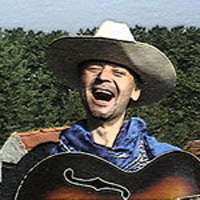 My name is Luboš Krtička and I am a musician.
My name is Luboš Krtička and I am a musician.I graduated from Pardubice Music Academy in trumpet and I also gained first experience with composition under the tuition of Prof. M Raichl.
At that time, I also helped in Pardubice Childrens Choir as a conductor assistant. I studied composition in the class of Prof. Jiří Dvořáček in Prague. After I graduated, I worked as a conductor of Czech Broadcast Childrens Choir in Prague, and Brixi Academic Choir.
However, I was conscripted then, and everything was different afterwards. The childrens department of the broadcasting as well as the choir was dismissed. Since then, I and the children have been on our own and we make our own living as well as it is possible. The choirs name is Kvodlibet.
I also co-operate with a very promising mixed choir from Prague whose name is Siloe.
If you want to know more, register in the Japanese Inspiration Atelier.
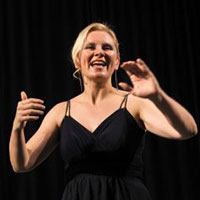
2025 – Ateliér 3

Alou, vivat, we will sing... or the musical world of Mirek Raichl
Choirmaster: Silvie Langrová
Miroslav Raichl: Milování bez vídání
Miroslav Raichl: Nepodařený den
upravil Miroslav Raichl: Chodský den
upravil Miroslav Raichl: Už se fašang kráci
upravil Miroslav Raichl: Škoda ťa, synečku
anonym, arr. Miroslav Raichl: Tři staročeské kantilény
Jaroslav Ježek, arr. Miroslav Raichl: Vousatý svět
Jaroslav Ježek, arr. Miroslav Raichl: Nikdy nic nikdo nemá míti za definitivní
Alou vivat, we will sing the way Mirek Raichl liked it, a composer whose birth will be 95 years this year and who needs no introduction to Czech choir singers.
Together we will "settle down" from folk songs and madrigals to arrangements of jazz great Jaroslav Ježek, which Raichl wrote for the Heuréka and ReBelcanto ensembles.
I believe that we will not experience a single Bad Day when encountering Raichl's music...
PS: pack loose clothes, maybe there will be dancing ????
Silvie Langrová

KonverterSilvie Langrová is a graduate of the Pardubice Conservatory, where she studied opera singing under Svatava Šubrtová, and the University of Hradec Králové in the fields of choral conducting and music education. Since 1997 she has been the choirmaster of the children's choir Severáček in Liberec, with which she has achieved considerable success (numerous victories and special prizes in Bratislava, Prague, Pärnu, Estonia, Preveza, Greece, Riva del Garda, Italy, also the prize for the best choirmaster, Neerpelt, Belgium, etc.). With Severacek she recorded 5 separate CDs. The choir under her direction has sung at the Prague Spring International Music Festival, established cooperation with the Czech Philharmonic Orchestra and regularly performs abroad, including in South Korea. She cooperates with the F. X. Šalda Theatre in Liberec, where he has been leading the Children's Opera Studio since 2022. The children of Severáček also perform in theatre productions (the operas Jacobin, The Cunning Little Vixen, La Bohème, Brundibár, Dialogues of the Carmelites, the ballet The Snow Queen, etc.) and he also cooperates with the opera in Görlitz, Germany (The Magic Flute, Sister Angelica).
In addition to her work as a choirmaster, Silvie Langrová also organises festivals for children's choirs (Porta musicae Liberec, Primachori Liberec, Malí śpieváčci Liberec), seminars for choirmasters and sits on the juries of national and international choir competitions (e.g. Llangollen - Great Britain, Cantonigros - Spain, Prague, Nový Jičín, etc.). She received the Choirmaster - Junior Award in 2004 and the František Lýsek Award in 2016. She is currently studying in the doctoral programme at the University of Hradec Králové.
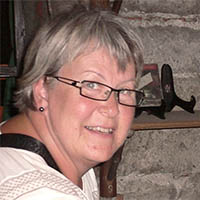
2001 – Ateliér 6

Spirituals
Choirmaster: Anne-Charlote Lundell
Spirituál – Siyahamba
N. Luboff – All My Trials
N. Luboff – Wade In The Water
M. Matamoros, E. Silva - Dulce Embeleso
J. Hudson, R. Sund Goodnight - Well It's Time To Go
1999 – Ateliér 6

Vocal works in arrangements by Swedish composers
Choirmaster: Anne-Charlote Lundell
Anne-Charlote Lundell

Jan Mikušek
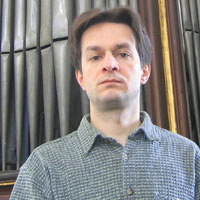 MgA. Jan Mikušek was born on November 11,1970 in Valašské Meziříčí. He studied dulcimer at the Conservatory of Music in Brno and conducting in the class of Evľen Holiš. In 1991 he became conductor of the men\'s choir Beseda in Valašské Meziříčí and assistant of the conductor of the choir Forster (nowadays the Czech Philharmonic Choir Brno). He continued in his studies of conducting at the Prague Academy of Music and graduated from the class of František Vajnar. He also studied singing - his teachers were Marcin B. Sczycińsky and Terezie Blumová. He is a regular participant in master courses of Mario van Altena. He engages in performing ancient music in ensembles Capella Regia and Ritornello, and has recorded several CD\'s. In 2001 he performed J.S.Bach\'s Matthaeus Passion as a soloist with the Hradec Králové Philharmonics and Boni Pueri at a tour in the Netherlands. He cooperates with Jiří Stivín in Collegium Quodlibet. He sings in the vocal-instrumental experimental ensemble Affetto which leads him to extend his specialization to contemporary music (M.tědroň, M.Košut, M.Nytra, A.Pärt, J.Meisl). He is co-founder of the International Dulcimer Festival and an active dulcimer player. He premiered many pieces for dulcimer, e.g. Trifolium by A.Tučapský, Mazel Tow by Vl. Wimmer, Psalms by Sv. Havelka, Concerto for dulcimer and orchestra by J.Meisl with the Hradec Králové Philharmonics. Recently he has been performing in the opera Nagano in the National Theatre. Since September 2000 he has been choirmaster of VOX.
MgA. Jan Mikušek was born on November 11,1970 in Valašské Meziříčí. He studied dulcimer at the Conservatory of Music in Brno and conducting in the class of Evľen Holiš. In 1991 he became conductor of the men\'s choir Beseda in Valašské Meziříčí and assistant of the conductor of the choir Forster (nowadays the Czech Philharmonic Choir Brno). He continued in his studies of conducting at the Prague Academy of Music and graduated from the class of František Vajnar. He also studied singing - his teachers were Marcin B. Sczycińsky and Terezie Blumová. He is a regular participant in master courses of Mario van Altena. He engages in performing ancient music in ensembles Capella Regia and Ritornello, and has recorded several CD\'s. In 2001 he performed J.S.Bach\'s Matthaeus Passion as a soloist with the Hradec Králové Philharmonics and Boni Pueri at a tour in the Netherlands. He cooperates with Jiří Stivín in Collegium Quodlibet. He sings in the vocal-instrumental experimental ensemble Affetto which leads him to extend his specialization to contemporary music (M.tědroň, M.Košut, M.Nytra, A.Pärt, J.Meisl). He is co-founder of the International Dulcimer Festival and an active dulcimer player. He premiered many pieces for dulcimer, e.g. Trifolium by A.Tučapský, Mazel Tow by Vl. Wimmer, Psalms by Sv. Havelka, Concerto for dulcimer and orchestra by J.Meisl with the Hradec Králové Philharmonics. Recently he has been performing in the opera Nagano in the National Theatre. Since September 2000 he has been choirmaster of VOX.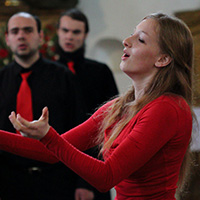
2015 – Ateliér 5

From spirituals to Bobby McFerrin
Choirmaster: Jana Mimrová
The workshop of spirituals and popular music will offer a wide repertoire of both well-known and less known dynamic and interesting pieces. We will “cook up” Chilli con carne, peep into the kitchen of the well-known vocal group The Real Group in the piece Words, or try the magic of Negro spirituals, e.g. in the piece I Want Jesus To Walk With Me, and of course we will not skip the well-known Don’t Worry, Be Happy by Bobby McFerrin.
The conductor Jana Mimrová is looking forward to you.
1. Witness - traditional spiritual (arr. Jack Halloran)
2. I Want Jesus to Walk with Me - traditional spiritual (arr. Moses Hogan)
3. Didn´t My Lord Deliver Daniel? - traditional spiritual (arr.Moses Hogan)
4. Elijah Rock - traditional spiritual (arr.Moses Hogan)
5. Ride The Chariot - Negro Spiritual (arr.Henry Smith)
6. Chilli con carne - The Real Group
7. Don´t worry, be happy - Bobby McFerrin
8. Ikaw – Filipino love song (Louie Ocampo)
Jana Mimrová

born on 22 November, 1994 at Ústí nad Orlicí, grew up at Česká Třebová in an inspiring music environment of her parents, the violinist, conductor, and pianist Bohuslav Mimra, and Miluše Mimrová. Since her childhood she has been brought to music, especially to the piano, to movement art skills (gymnastics, ballet), as well as to theatre. Since 2010 she has been studying conducting at the Music Conservatory of Pardubice. She has passed her A levels at the class of Mgr. Jaroslav Brych and MgA. Tomáš Žídek Ph.D., who has become her supervisor in further studies. She continues her education in the piano class of Mgr. Pavlína Klokočníková. In January 2015 she passed entrance exams to the Academy of Performing Arts in Prague.
As conductor she cooperates with Jaroslav Kocián’s Chamber Orchestra at her birthplace, and has performed extensive repertoire with it, e.g. Biblical Songs by A. Dvořák with the baritone Jaroslav Patočka. She also cooperates with the Symphony Orchestra of the Music Conservatory of Pardubice, with the Pardubice Chamber Orchestra, with the choir Salvator, and works as assistant to the chief conductor of VUS Pardubice. Apart from the piano, she also studies the violin and the organ.
Jana Mimrová took part in the conducting competition in Žilina in May, 2014, she took part in choir conducting classes in Hradec Králové lead by the choirmasters prof. J. Skopal and J. Surovík. For 15 years she has been regularly attending International Music Courses ČHS-SPKU at Litomyšl (or Bechyně, before that), piano courses lead by F. Malý, violin courses lead by M. Štrausová, and has set up her own choir. As choirmaster she has taken part in studying Dvořák’s Stabar Mater (PHJ, 2014).
Stanislav Mistr
 Born in 1962, he graduated from the Paedagogical Faculty of Charles University in Prague, where he studied choirmastery in Prof. Lubomír Mátl\'s class. He also studied classical singing under Prof. Dagmar Součková. After spending some time in AUS VN (artistic ensemble of the Czech Army) he became a tenor soloist in Prague Chamber Opera, where he rendered for example Ferrand in Mozart\'s "Cosi fan tutte" and Abraham in the coloratura version of the "Abraham and Isaac" oratorio by Josef Mysliveček at the Prague Spring festival.
Born in 1962, he graduated from the Paedagogical Faculty of Charles University in Prague, where he studied choirmastery in Prof. Lubomír Mátl\'s class. He also studied classical singing under Prof. Dagmar Součková. After spending some time in AUS VN (artistic ensemble of the Czech Army) he became a tenor soloist in Prague Chamber Opera, where he rendered for example Ferrand in Mozart\'s "Cosi fan tutte" and Abraham in the coloratura version of the "Abraham and Isaac" oratorio by Josef Mysliveček at the Prague Spring festival.
In his artistic career, he pursues both singing and conducting. Since 1992, he has been the leader of the mixed-voice choir Praľští pěvci (Prague Singers - see www.prazstipevci.cz), which he himself established and which has won numerous prizes at international competitions (e.g. two first prizes from Jersey 2002). The choir focuses on preparing world premieres of contemporary works (such as the multi-spatial oratorio "Lux mirandae sanctitatis" by Mark Kopelent). The most recent recording by Praľští pěvci is a collection of 3 compact discs with the complete set of Antonín Dvořák\'s choir pieces and duets, prepared for the Dutch publishing house Brilliant Classics. In 2004, Stanislav Mistr led the master class focused on 20th century choral music (Mass in G major by F. Poulenc) at the 1st year of Convivia classes in eliv.
He is a member of the Prague Philharmonic Choir, with which - as a guest choirmaster - he prepared, among others, Bach\'s Mass in H minor for the festival in Ravenna. Besides that, he is a member of several other ensembles, such as Gutta Musicae, male-voice choir Fraternitas literatorum, and the French ensemble Doulce memoire, all focusing on old music.
Stanislav Mistr also devotes to teaching and - being a skilled multi-instrumentalist - to non-artificial music.
Jan Míšek
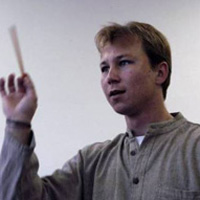 (1976) gained his first choirmaster experience conducting preparatory choirs of Boni Pueri. His teachers have been prof.Jiří Skopal (University in Hradec Králové) and doc. Vlastislav Novák (Conservatory of Music Pardubice). He completed many conducting and composing master courses (prof. Gert Frischmuth, Gábor Hollerung, prof. Friedrich Krell, Robert Sund, prof. Jerry Jordan, Petr Vronský, Jan Jirásek, Ofer ben Amots) and Bachakademie Stuttgart in the class of prof. Helmuth Rilling.
(1976) gained his first choirmaster experience conducting preparatory choirs of Boni Pueri. His teachers have been prof.Jiří Skopal (University in Hradec Králové) and doc. Vlastislav Novák (Conservatory of Music Pardubice). He completed many conducting and composing master courses (prof. Gert Frischmuth, Gábor Hollerung, prof. Friedrich Krell, Robert Sund, prof. Jerry Jordan, Petr Vronský, Jan Jirásek, Ofer ben Amots) and Bachakademie Stuttgart in the class of prof. Helmuth Rilling.
In 1993 he set up the choir of the J.K.Tyl Grammar School, in 1996 he began conducting the Chamber Choir Kantiléna and helped to set up the Hradec Králové Men\'s Choir. In 1999 he realized his great dream and set up the boys\' choir Bonifantes in Pardubice. He has obtained many prizes for extraordinary conducting performance and dramaturgy. During a short period he won 16 gold medals (e.g. with the Hradec Králové Men\'s Choir at the 1st world choir Olympics in Linz, Austria) and 13 silver medals at various international competitions.
As a composer Jan Míšek specializes in cantatas (Inter Arma Silent Musae, Girl with Matches) and in theatre music (Kidnapping or Red-and-white Comedy). In 2008 his piece Hachnisini Takhat Kenafech won the second prize at the International Joseph Dorfman composer\'s competition. In 2003 he was awarded the price Choirmaster Junior by the Czech Choirs Association. Jan Míšek is also editor and mastermind of the Czech internet server for choir art SBOR.CZ. He is respected among experts for interpretation of 20th century music, at present he engages also in authentic interpretation of ancient music. Apart from choirmaster he is also an orchestra conductor.

2020 – Ateliér 5

Choirs in movie soundtracks
Choirmaster: Marek Müller
John Williams - Star Wars, Duel of the Fates
Howard Shore - Lord of the Rings, In Dreams
John Williams - Harry Potter, Double Trouble
Hans Zimmer / Richard Harvey - The Da Vinci Code, Kyrie For the Magdalene
Guido a Mauricio De Angelis - Jestli se rozzlobíme, budeme zlí, Coro Dei Pompieri
Movie soundtrack is a contemporary phenomenon of music creation. In this atelier we will perform compositions in which the choir is an essential part of the soundtrack of well-known movies such as Star Wars, Lord of the Rings, etc.
Marek Müller

Miriam Němcová
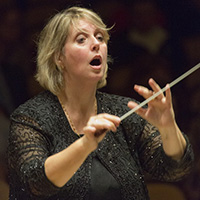
Miriam Němcová began her conductor’s career at the age of sixteen with non-professional choirs (the choirs ROSA and VUS UK, the Quattro corde chamber choir). After graduating from the Prague Consevratory of Music – majoring in composition and conducting (among others with the conductor Václav Neumann) – she has cooperated with professional choirs: Suk’s Chamber orchestra, the Karlovy Vary symphony, the Hradec Králové Philharmonic, the Czech Radio Choir, and the Prague Philharmonic Choir. From 1987 to 1988 she was scholar of the Czech Philharmonic with Prague Madrigalists, and several times she has been scholar at the Bach-Akademie in Stuttgart with prof. H. Rilling. After her return from the study visit to Paris (1989) she worked in Prague Chamber Opera and in F. X. Šalda Theatre in Liberec, where she obtained the post of director in 1991 after her one-year stint with the Karlovy Vary symphony. After a successful production of Verdi’s Othello in Antonín Dvořák Theatre in Ostrava she was offered the post of conductor and choirmaster in the State Opera in Prague in 1993. Since 1995 Miriam Němcová has been teaching conducting and at the same time directing the symphonic orchestra at the Prague Conservatory of Music. Besides that she keeps performing at concerts both in our country and abroad.
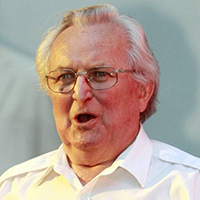
1990 – Ateliér 5

Miroslav Raichl
Choirmaster: Vlastislav Novák
Miroslav Raichl – Něbuj se, Maryško
Miroslav Raichl – Počúvaj, počúvaj
Miroslav Raichl – Milování bez vídání
1989 – Ateliér 5

Bohuslav Martinů ? Czech Madrigals
Choirmaster: Vlastislav Novák
Bohuslav Martinů – Aj, stupaj
Bohuslav Martinů – Chceme, my se chceme
Bohuslav Martinů – Půjdeme, půjdeme
Vlastislav Novák


2018 – Ateliér 4

Jewish music - women's workshop
Choirmaster: Tomáš Novotný
Apart from both traditional and modern Jewish songs in Hebrew and Yiddish, the workshop will contain introduction to Judaism and Jewish music and culture.
According to the participants enrolled, some of the following songs will be chosen:
Aní ma’amín – Mezzosoprano solo
Čiribim, čiribom – two Mezzosoprano soloists
Ešet chajil
Hevenu šalom
Chesed ve’emet nifgašú – Mezzosoprano solo
Ki onu amecho
Lecha dodí – Mezzosoprano solo
Majko mašme lon
Rumenje (Lebeděf)
Simeni chachotam – Alto solo
Sisu et Jerušalajim
Ša, štil – Alto solo
Šolem zol zejn
The conductor will speak Czech, English and Hebrew.
2018 – Ateliér 3

Fires from four sides... - songs of Jiří Pavlica in choral array
Choirmaster: Vít Novotný
The workshop will offer various encounters with both the music of Jiří Pavlica and the author himself. The following songs will be sung in diverse arrangements for choir both a capella and with accompaniment.
Svatý Ján (Saint John)
Velkomoravský chorál (Great Moravian hymn)
Láska (Love)
Poslední list (The last leaf)
Krátký popis léta (Short account of Summer)
Members of the workshop will take part at the concert of Jiří Pavlica and Hradišťan on Friday August 25. At the concert the choir might sing e.g.
Modlitba za vodu (Prayer for water)
Haleluja
Až se budeš bát (When you are scared)
The conductor will speak Czech and English.
2015 – Ateliér 4

Jewish Music
Choirmaster: Tomáš Novotný
- hlavni.zip
all pieces the conductor wants to study and sing at festival concerts
- doplnkovy.zip
these pieces may be studied at the festival, but probably will not be performed at concerts
- ostatni.zip
other Jewish songs - a gift for you from the conductor
Tomáš Novotný

Dr. Tomáš Novotný graduated from Prague Conservatory in Composition, Orchestral Conducting, and French Horn Performance. He also graduated from the Evangelical Faculty in Prague where he obtained a doctorate in the Old Testament in Hebrew Wisdom Literature. He uses all of his excellent qualifications cohesively through his direction of and involvement in the Adash choir. Currently, he teaches with the Faculty of Arts at Ostrava University.
Vocal ensemble Adash
The vocal ensemble Adash has been developed from a unique course of Hebrew, taught at Ostrava University by Dr. Tomáš Novotný. Because he uses Hebrew songs to teach the Hebrew language, the course is titled 'Hebrew Through Songs'. In Hebrew: Ivrit Derekh Shirim. The ensemble has derived their name from this title 'Hebrew Through Songs'; the name Adash is the acronym of the three Hebrew words. When in 1999 the students showed publicly for the first time the songs they used for learning Hebrew, the demand was so great that they were invited to perform many real concerts. As a result of this, Adash has performed several hundreds of concerts in less than ten years of existence. From Europe to the USA, from concert halls to churches, from parliament to synagogues. One of the highlights for this group is the concert they performed at the prestigious International Music Festival Prague Spring in 2004. At present Adash often gives its concerts in cooperation with the klezmer band Naches.
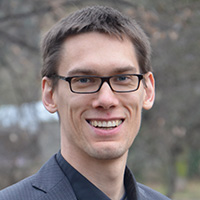
2018 – Ateliér 3

Fires from four sides... - songs of Jiří Pavlica in choral array
Choirmaster: Vít Novotný
The workshop will offer various encounters with both the music of Jiří Pavlica and the author himself. The following songs will be sung in diverse arrangements for choir both a capella and with accompaniment.
Svatý Ján (Saint John)
Velkomoravský chorál (Great Moravian hymn)
Láska (Love)
Poslední list (The last leaf)
Krátký popis léta (Short account of Summer)
Members of the workshop will take part at the concert of Jiří Pavlica and Hradišťan on Friday August 25. At the concert the choir might sing e.g.
Modlitba za vodu (Prayer for water)
Haleluja
Až se budeš bát (When you are scared)
The conductor will speak Czech and English.
Vít Novotný

Petr Pálka
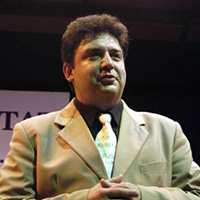
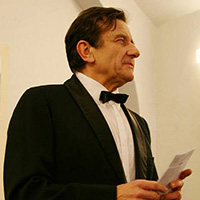
1989 – Ateliér 4

Choirmaster: Vladimír Petržilka
Václav Trojan – České pastorely pro dívčí sbor
Leonard Bernstein – Warm up
V. Nees – Ricordi di Sicilia
Vladimír Petržilka

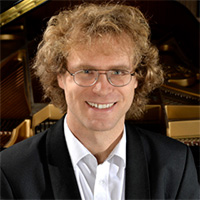
2020 – Ateliér 3

The Lion with a White Mane
Choirmaster: Jan Polívka
Leoš Janáček: Elegy on the death of daughter Olga
Leoš Janáček: Nursery Rhymes
I do not know a composer who can express more with less effort. Janáček just needs one motive and I smell a fire, I see clouds in the sky, stabbing you at heart, heart laughing, soul flying home. Without sentimentality, alive, with a courtly feeling, with sharp eyesight and genius, he distills the music of forests, fields, animals, but mainly humans, into short, powerful chants and sends them into battle like a general. To life, to life!
In Elegy on the death of daughter Olga, Janáček lays out all his love for his daughter. In the Nursery Rhymes, he offers us a masterpiece composition, a musical wit, but above all a fiery heart and wide eyes of a child.
Jan Polívka

I was born on December 31, 1975 in Pacov into a musical family. Soothed beside milk, beef soups and orange juice mainly by singing and playing myriad of musical instruments, I clung to the music art and I couldn't do anything else... maybe just to draw a little and write less comprehensible texts.
I learned singing in the Children's Choir with Čestmír Stašek, and besides my family, a great inspiration for me has been meeting with great musicians like Petr Šefl, Karel Loula and especially Miloš Bok.
So I spent my youth oscillating between Renaissance vocal polyphony, Bach's arias and glorious Romantic era.
I was lucky to be thrown into the class of prof. František Maxián, who taught me to play the piano.
A short trip to Frankfurt am Main turned into 24 year's stay. Irina Edelstein master piano class. Wolfgang Schäfer Choir, married to Karin Mayle and already torturing our four children with violins.
With my Czech-German choir “Frankfurt-Prague” we have been performing for 30 years bold programs from Bach to Stravinsky. I am also a conductor of the Main Kammerorchester and beside all that, I went crazy about Janáček... on “Nursery Rhymes”.
Lukáš Prchal
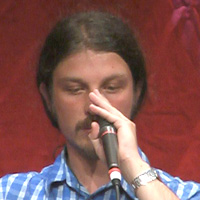
Lukáš Prchal (*1980) graduated from the conducting class of prof. Hynek Farkač at the Jaroslav Ježek Conservatory of Music. Since, however, he has grown-up in the Prague Children Choir, he has specialized in choir conducting. In 2002 he took over the mixed choir Mikrochor from Čestmír Stašek, since 2003 he has been the artistic director of the a cappella female vocal group Brécy (www.brecy.info), where he also represents the bass-percussion section as beatboxer. Although he has already as a child taken in the fact that being a choirmaster in a children choir is a purgatory, he has not escaped this experience and has conducted the children choir Chorus Angelus. As an arranger he specializes in a cappella non-artificial music. He is a covert trumpet player and overt piano hater. He has participated in choir conducting courses with prof. Wolfgang Schäfer in Germany. He has introduced several premieres, and together with Ester Kočičková and Petr Wajsar he has been performing the great choir vocal-dance music project Mandelbrot's cubes. He avowedly enjoys frequent cooperation with pop, rock, punk and metal music artists and performers (Michal Pavlíček, the Czech version of Pink Floyd: The Wall, Už jsme doma, Atari Terror, 4th Face...).
Ottokar Prochazka
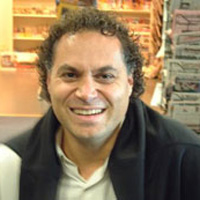 teacher of conducting, choir conducting and score playing at the Music University in Vienna
teacher of conducting, choir conducting and score playing at the Music University in Viennaleader of the Arnold Schönberg Choir studio
engaged in conducting, choir conducting, leading recording studio, theatre music and lecturing
Wolfgang Saus
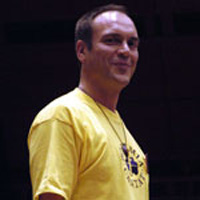 Wolfgang Saus, a man of natural science
(physical chemistry) by profession, has devoted himself to singing
strenuously since his childhood. He joined about 60 European ensembles
as a choir singer and a soloist as well, and he had the opportunity
to co-operate with many distinguished professional singers (e.g. King
Singers) and conductors. By singing, he earned money in order to pay
for his education.
Wolfgang Saus, a man of natural science
(physical chemistry) by profession, has devoted himself to singing
strenuously since his childhood. He joined about 60 European ensembles
as a choir singer and a soloist as well, and he had the opportunity
to co-operate with many distinguished professional singers (e.g. King
Singers) and conductors. By singing, he earned money in order to pay
for his education.He first learned about overtone singing in 1983 when he met Joachim Ernst Berendt, and this technique of singing fascinated him immediately. He turned to overtone singing completely, and when he found out he did not have enough time for singing because of his successful scientist career, he decided to give up science and devote himself only to music.
At present, he is among the best overtone singers in the world (Nobody but Christian Zehnder or Start Hinds can compete with him in polyphonic overtone singing). He organizes seminars of overtone singing all over Europe. His wide knowledge has lately been comprised in a publication, which is the first broader work about overtone singing published in German. He founded an overtone choir in Aachen which will perform in Liberec during the festival. In addition, Wolfgang Saus established web sites about overtone singing (www.oberton.org), which helped many overtone singers all over the world to get in touch.
Steffen Schreyer
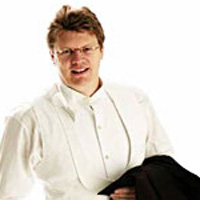 After his diploma in church music and organ at the University College of Music in Munich (Germany) he concentrated his post-gradual studies on choir conducting at the Royal College of Music in Stockholm (Sweden) under Prof. Anders Eby. He received a scholarship for post-graduates by the DAAD (German Academic Exchange Service) and together with his diploma in 1997 he was honoured by the very seldom given "belöningsjeton" - the medal of the Musical Academy of Sweden. He was actually the first choral conducting student ever who received a jeton as a sign of outstanding results.
After his diploma in church music and organ at the University College of Music in Munich (Germany) he concentrated his post-gradual studies on choir conducting at the Royal College of Music in Stockholm (Sweden) under Prof. Anders Eby. He received a scholarship for post-graduates by the DAAD (German Academic Exchange Service) and together with his diploma in 1997 he was honoured by the very seldom given "belöningsjeton" - the medal of the Musical Academy of Sweden. He was actually the first choral conducting student ever who received a jeton as a sign of outstanding results.
He freelanced as a conductor with the Swedish Radio Choir, the Eric-Ericson Chamber Choir, the WDR Radio Choir Cologne, the NDR Radio Choir Hamburg etc., with Stockholms Sinfonietta and the Russian Chamber Philharmonic St. Petersburg and others.
Since 2001 Steffen Schreyer holds a professor\'s chair in choir conducting at the Catholic College of Church Music St. Gregorius in Aachen (Germany). He is the musical director of the College\'s Chamber Choir.

2024 – Ateliér 3

To the land of a thousand lakes or a cross-section of Finnish folk songs
Choirmaster: Ráchel Skleničková
Jean Sibelius, arr. Ráchel Skleničková - EN ETSI VALTAA
Finnish folk - 392 Minä itse
Finnish folk - Juokse sinä humma
Finnish folk - SYYLLINEN SYLI
Are you tempted to experience the land of reindeer, saunas and vodka, the land of a thousand lakes? To immerse yourself in the mysterious, for us already a bit alien folk music of this wind-whipped nation? Four folk songs of different regions and moods await you. We'll get our tongues in a twist as we learn Finnish and the traditional folk instrument, the kantele, will be available to try out. We will also demonstrate the kulning singing technique, widespread throughout Scandinavia.
Ráchel Skleničková

Rachel Skleničková was born 21.6.1992 in Prague. In 2003 she entered the Jan Neruda Grammar School in Prague, where she studied two majors: piano with MgA. Ružena Učňová and singing with MgA. Magdalena Bělohlávková.
In 2006 she started her studies at the Jan Deyl Conservatory and Secondary School for the Visually Impaired (she is completely blind), where she studied piano with MgA. Jana Köhlerová and a second major in voice with MgA. Nadězda Ostřanská.
In 2011 she participated in the piano winners' concert at The Very Special Art competition in Washington, where she was selected as one of the three winners.
In the Czech Republic, she has also successfully participated in several competitions, mainly in the field of classical piano.
She has performed successfully at the Prague Proms and Prague Spring Festivals with a piano concerto by L. van Beethoven.
In 2015, she was a guest at the 18th annual Spannungen Festival organized by Lars Vogt in Heimbach, Germany.
In June 2014 she graduated from the Jan Deyl Conservatory in piano performance and received the degree of DiS. She then studied piano at the Prague Academy of Performing Arts under Prof. Ivan Klánský and Prof. František Malý, graduating in 2021.
In the summer of 2017 she released a CD as part of the Kalkant project supported by the Czech National Symphony Orchestra among seven other young artists.
Ak. In 2018-2019 she studied in Helsinki within the Erasmus programme at Sibelius Academy under the piano direction of Prof. Hanna Aho. However, there was also education in choral music and Nordic singing techniques and playing folk instruments (Scandinavian violin or kantele).
Although her main field of study is piano, she also boldly dabbles in other fields, such as classical singing in the past - she graduated in this field in 2013 - and pop and jazz singing in the present, which she has applied, for example, in television broadcasts in collaboration with the Světluška Foundation in duets with famous personalities such as Tomáš Klus, the group Čtyřtet or Miro Žbirka, with whom she released the duet Čistý svet in 2019. The cooperation with this foundation contributed in no small part to her contact with famous personalities and later helped her career rise. She also composes occasionally. She has no formal training in choral conducting or conducting, but she has years of experience working with the Gabriel Choir, which she also conducts when performing some of its repertoire.
https://www.gabrielos.cz/
In her spare time she enjoys playing sports, travelling, learning new languages such as Finnish, which she applied during her Erasmus studies, and going outdoors.
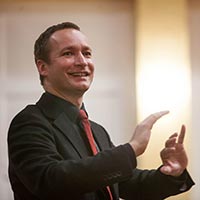
2022 – Ateliér 3

Missa festiva
Choirmaster: Jiří Skopal
John Leavitt - Missa Festiva
Kyrie
Gloria
Credo
Festival Sanctus
Agnus Dei
John Leavitt - Gloria z Petite Mass
Jiří Skopal


2016 – Ateliér 6

Negro gospels and African songs with Leoš Černoušek
Choirmasters: Libor Sládek, Jan Staněk
Traditional as well as modern gospel pieces with focus on performance authenticity in both technique and style, including solo improvisation – call and response. The pieces are full of emotion and energy with extensive dynamic manifestation, blues-jazz harmonies, and syncopated swing rhythms.
The African songs have been chosen from South African provinces of Negro zulu tribes. These folk songs are great as voice warm-up and include movement choreography.
Spirituals, gospels, African songs:
Amavolovolo - arr. Rudolf de Beer
Amen, amen - arr. Nelsie T. Johnson
Amen! Tell It on the Mountain! - arr. Mary McDonald
Aya ngena - arr. Ruth Morris Gray
Aya ngena - traditional
Hallelujah - from „Händel's Messiah: A Soulful Celebration“ - G.F. Händel, arr. Mervyn Warren, Michael O. Jackson, Mark Kibble
Senzenina - traditional
Siyahamba - traditional
The Battle of Jericho - arr. Moses Hogan
The Storm Is Passing Over - Charles Albert Tindley, arr. Barbara W. Baker
Total Praise - Richard Smallwood, arr. Patrick Barret, Doreen Rao
Umahlalela - arr. Michael Barrett
2011 – Ateliér 6

Jazz
Choirmaster: Libor Sládek
Bent Peder Holbech - Missa Rotna
for mixed chorus and two soloists - soprano and baritone - with piano, electric bass and percussion.
2006 – Ateliér 2

Choirmaster: Libor Sládek
2004 – Ateliér 3

Choirmaster: Libor Sládek
2003 – Ateliér 5

Choirmasters: Libor Sládek, Jan Staněk
2001 – Ateliér 5

Rock oratory
Choirmaster: Libor Sládek
J. Johansen, E. Kullberg - Eversmiling Liberty
1998 – Ateliér 1

Choirmaster: Libor Sládek
Zdeněk Lukáš – Horo, horo vysoká siZdeněk Lukáš – Veselá kopa
Zdeněk Lukáš – Hostias (část Requiem)
Zdeněk Lukáš – Na horách
1997 – Ateliér 5

Choirmaster: Libor Sládek
J. Johansen, E. Kullberg – Eversmiling liberty (výběr)Libor Sládek

Ing. Libor Sládek\' s original profession is civil engineer. He studied at the faculty of building of the Czech Technical University and spent three years working in an architectural office. Then he started teaching special constructional subjects at the grammar school Na Zatlance in Prague, and after the revolution in 1989 he taught also mathematics and music. Since 1994 he has been teaching at the new Jaroslav Heyrovský\'s grammar school in Prague. At present he conducts three mixed choirs with varied repertoires (Besharmonie, Mix, Bohemiachor). In 2000 he won the public enquiry for the most popular teacher in the Czech Republic, the Golden Amos. In 2001-2004 he completed studies of church choir conducting and in 2007 he graduated from music and choir conducting at the Charles University under the direction of professor Mátl.

2015 – Ateliér 3

Contemporary choral works and movement
Choirmaster: Jiří Slovík
Participants will learn songs by authors of XX. and XXI. centuries.
You will combine singing with simple stage movement, and it will enhance your experience of interpretation and listening.
You will enjoy it.
Per crucem tuam - Petr Pálka
Ubi caritas - Ola Gjeilo
Memento homo - O. Fišer
1 from lenten motets - A. Tučapský
Bolavá hlavěnka (Sore heart) - Bohuslav Martinů
V hornom koncu sviťá (They turn on lights) - J.Pospíšil
Ave Maria - Jaakko Mäntyjärvi
And something to please heart and soul:
Run to you!!!!!!!!!!!! - K. Busola
Jiří Slovík

Mgr. Jiří Slovík currently works at MGO, Department of Music at the J.E. Purkyně University in Ústí nad Labem.
In 1995, he established and the Opava Student’s Choir Luscinia, which he still conducts to present day. This choir soon became one of the best, not only in the Czech Republic. It has received praise and awards at international choir competitions, e.g. Middlesbrough and Llangollen in Great Britain, Cantonigros in Spain, Ankara in Turkey, Celje in Slovenia, etc.
Up until 2009, he worked as a conductor of the school choir and chamber choir at Janáček Conservatory in Ostrava. The chamber choir, KomoraCZECH, won the international festival Young 2004 Prague, where Jiří Slovík also received an award for his conducting. The choir was also victorious in this competition in 2007.
At present, he also conducts the Choral Society of Silesian Teachers; he founded and now heads the Janáček Symphonic Choir associated with the Janáček Symphonic Orchestra in Ostrava, Con Moto Slovakia and a choir under the Department of Music at J.E. Purkyně Univesity.
He established and conducted the VENTUS Girls’ Choir in Krnov, which placed 1st at Iuventus Mundi Cantat in Olomouc in 1997, received 1st place twice in Middlesbrough 1995 and 1st place during the Prague Choir Days in 1996. In the past, he conducted the children’s choir Červený květ in Opava, which placed 2nd at Iuventus Mundi Cantat in Olomouc and 5th in Arezzo, Italy.
He is a member of international competition juries in Slovakia, Poland, the Czech Republic, he is the co-founder of the choral festival Opava Cantat and of the international youth choir Silesia Cantat.
Jiří Slovík graduated from the Ostrava University, where he had studied under the lead of prof. Lumír Pivovarský.
In 2006, he was awarded for his life-long creative work by the then president of the Czech Republic, Václav Klaus.
Martin Smolka
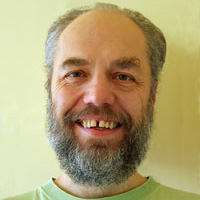 Martin Smolka (b. 11 August 1959, Prague), studied composition at the Academy of Performing Arts in Prague and privately with Marek Kopelent. His work has won him recognition both at home and abroad. In 1983 he co-founded Agon, an ensemble specializing in the present and past of the musical avant-garde. He worked as its artistic director and player of prepared piano until 1998. In the course of Agon projects he has worked on realization of graphic scores and concepts, and together with Petr Kofroň published a book and compact disc titled Grafické partitury a koncepty / Graphic Scores and Concepts (Czech-English).
Composition of concert pieces and operas is Smolka\'s main occupation.
Since year 2000 one of the focuses of Smolka\'s interest has been vocal music and particularly opera (Walden, the Distiller of Celestial Dews for choir, 2000; Nagano - opera 2001-3; Das schlaue Gretchen - fairy-tale opera for children, 2005). Nagano (opera about ice-hockey), written on commission of National Theatre in Prague, won a national Alfred Radok Prize 2004.
Martin Smolka (b. 11 August 1959, Prague), studied composition at the Academy of Performing Arts in Prague and privately with Marek Kopelent. His work has won him recognition both at home and abroad. In 1983 he co-founded Agon, an ensemble specializing in the present and past of the musical avant-garde. He worked as its artistic director and player of prepared piano until 1998. In the course of Agon projects he has worked on realization of graphic scores and concepts, and together with Petr Kofroň published a book and compact disc titled Grafické partitury a koncepty / Graphic Scores and Concepts (Czech-English).
Composition of concert pieces and operas is Smolka\'s main occupation.
Since year 2000 one of the focuses of Smolka\'s interest has been vocal music and particularly opera (Walden, the Distiller of Celestial Dews for choir, 2000; Nagano - opera 2001-3; Das schlaue Gretchen - fairy-tale opera for children, 2005). Nagano (opera about ice-hockey), written on commission of National Theatre in Prague, won a national Alfred Radok Prize 2004.
2019 – Ateliér 3

3x Thomas Morley, or How about this way?
Choirmaster: Kryštof Spirit
Thomas Morley: No, no, Nigella à 5
Robert Lucas Pearsall: No, no, Nigella à 8
Thomas Morley: Now is the month of maying à 5
Kirby Shaw: Now is the month of maying à 4
Thomas Morley: My bonnie lass she smileth à 5
Peter Schickele: My bonnie lass she smelleth à 5
I love to combine old music with modern, contemporary music. At the same time, I hate boredom in music. That's why I chose the three beautiful sprightly madrigals from the English Renaissance composer Thomas Morley, to which we will try to rehearse their modern “covers.” The setting by Robert Lucas Pearsall is “brahmsly” romantic, while the song by Kirby Shaw nearly resembles spiritual. And nothing needs to be said about the musical parody by prof. Peter Schickele, the creator of the fictitious forgotten Bach's son P. D. Q. Bach. One needs only to experience it.
Kryštof Spirit

Kryštof Spirit has dedicated his professional life to classical music as a singer, choirmaster, conductor and musicologist. At present, he is the artistic director of the Ensemble Hilaris vocal ensemble, choirmaster of the Musica Oeconomica Pragensis choir at the University of Economics in Prague and editor of the Czech Radio D-dur station. As a conductor he values the most the opportunity to work with Prague Philharmonia (PKF) in a series of concerts and workshops for children, and as a singer his performances in opera projects of the National Theater – e.g. Curlew River by Benjamin Britten and Orfeo by Claudio Monteverdi. His other activities include preparation of accompanying texts for concert programs or Czech Radio music programs. He also restores older musical works, arranges music and organizes interesting music projects. He takes pleasure in making music together with people who are good musicians and, especially, good people.

2025 – Ateliér 2

With playful women, both seriously and frivolously
Choirmaster: Jan Staněk
Giovanni Battista Pergolesi - Stabat Mater
Harry Warren, Mack Gordon - Chattanooga Choo Choo
Jules Styne, Sammy Cabn - It's been a long, long time
Dear ladies,
Stabat mater by Giovanni Battista Pergolesi is an extremely beautiful and profound piece.
Although the text is generally painful and tragic, some parts are light, almost dance-like in musical expression.
There is suffering in them, but also reconciliation and faith in the meaning of sacrifice.
I hope that we will manage to get as deep as possible from the black dots to the core of this beautiful music.
That will be on Saturday.
And so that we don't "go crazy" about it, we will cut two popular jazz songs at the concert on Sunday.
In them, we will not strive for any discovery of spiritual truth, we will just have fun together.
I look forward to making music with you.
Honza Staněk
2019 – Ateliér 6

Schubidubi Halleluja II.
Choirmaster: Jan Staněk
Birdland (Josef Zawinul / Jon Hendricks, arr. Jerry Nowak)
Mack the Knife (Kurt Weill / Bert Brecht, Marc Blitzstein, arr. Anita Kerr)
Rock Around the Clock (Max C. Freedman, Jimmy de Knight, arr. Jeff Funk)
Shout Glory! (Byron J. Smith)
The Rhythm of Life (Coleman / Dorothy Fields)
Total praise (Richard Smallwood)
You show me (Nico Schlenker)
Gospels and jazz songs could be similar in form, harmony and even melodies, however they differ significantly.
A gospel should be directed inward, experienced in the soul meditatively, or even ecstatically. It should captivate by its spiritual contents and talk to God or about God. If the Hallelujah is not lived through inwardly while singing, it could be quite pathetic and even annoying…
Jazz songs can be annoying, too. Especially by trivial lyrics, often unsuitable for choirs (imagine 80 singers of both sexes expressing their passion for some „baby”). However, the lyrics in these songs is not the most important part, we often just want to enjoy the syncopation. Therefore, we can simply ignore lyrics and use some “schubidubi” or another nonsensical syllable. It does not really matter.
I hope to sing about God on Saturday in the church and make a show to entertain the audience on Sunday. I would like to follow up on the first version of this workshop and raise the roof like in 2013.
2016 – Ateliér 6

Negro gospels and African songs with Leoš Černoušek
Choirmasters: Libor Sládek, Jan Staněk
Traditional as well as modern gospel pieces with focus on performance authenticity in both technique and style, including solo improvisation – call and response. The pieces are full of emotion and energy with extensive dynamic manifestation, blues-jazz harmonies, and syncopated swing rhythms.
The African songs have been chosen from South African provinces of Negro zulu tribes. These folk songs are great as voice warm-up and include movement choreography.
Spirituals, gospels, African songs:
Amavolovolo - arr. Rudolf de Beer
Amen, amen - arr. Nelsie T. Johnson
Amen! Tell It on the Mountain! - arr. Mary McDonald
Aya ngena - arr. Ruth Morris Gray
Aya ngena - traditional
Hallelujah - from „Händel's Messiah: A Soulful Celebration“ - G.F. Händel, arr. Mervyn Warren, Michael O. Jackson, Mark Kibble
Senzenina - traditional
Siyahamba - traditional
The Battle of Jericho - arr. Moses Hogan
The Storm Is Passing Over - Charles Albert Tindley, arr. Barbara W. Baker
Total Praise - Richard Smallwood, arr. Patrick Barret, Doreen Rao
Umahlalela - arr. Michael Barrett
2014 – Ateliér 2

Mosaic from Eastern Europe
Choirmaster: Jan Staněk
Mixture of Eastern European sacred music of various genres and nationalities.
(With regard to the expected participants from German-speaking countries the workshop will be mostly in German)
Andrzej Koszewski (*1922): Zdrowaś Królewno wyborna (1963)
Konstantin Švedov (1886-1954): Divine Liturgy of St. John Chrysostom "Gospodi spasi blagochestiviya"
Ionel Doru Popovici (*1932): Amin
Aleksandr Tichonovič Grečaninov (1864-1956): Missa festiva (1937) - Gloria
Vaclovas Augustinas (*1959): Anoj pusej dunojelio
Urmas Sisask (*1960): Omnis una (from Gloria patri - 24 hymns for mixed choir)
Our workshop will be international this year. We are expecting singers from Austria, Germany, Switzerland and Southern Tyrol. Therefore I will speak mostly German (though I will say some important information in Czech too).
I would like to introduce music from Eastern Europe to singers from Western Europe in Central Europe.
It was difficult to choose the pieces for the workshop, I liked too many. But even now, two months after the decision had been made, I think I have made the right choice and you will like the mostly sacred pieces in our mosaic.
2013 – Ateliér 5

Shoobidoobi Hallelujah!
Choirmaster: Jan Staněk
arr. Robert Sund: If you´re happy
arr. Keith Hampton: Praise His Holy Name
arr. Clarence Eggleton: Take me to the Water
Slim Gaillard, Slam Stewart, Bud Green, arr. Kirby Shaw: Flat Foot Floogee
Louis Prima, arr. Mac Huff: Jump, Jive an´Wail
Nacio Herb Brown, Arthur Freed, arr. Ruth Elaine Schram: Singin´in the Rain
Gospels and jazz songs can have a similar form, harmony and melody.
And still they are quite different.
Gospel should be inward oriented, experienced inwards, either meditatively, or ecstatically. It should be fascinating through its spiritual content, speak to God or about God. If Hallelujah is not deeply enjoyed inwards, it is too pathetic and can be even annoying…
Jazz songs can be annoying too. Especially for their shallow texts often unsuitable for choir (if 80 singers confess their love to a “baby”…). But the text is usually not important in the songs, we rather want to enjoy syncopes. And so it is better not to think too much about the texts, we can use a sound constant such as subi dubi. It is not important.
I hope we will succeed in singing about God in the church on Saturday, and making a show at the concert on Sunday, having fun and amusing the audience. It does not contradict each other.
2011 – Ateliér 2

Contemporary Czech music
Choirmaster: Jan Staněk
Pavel Staněk (*1927) - Missa Semplice
parts: Sanctus, Benedictus, Credo and Agnus Dei
I am happy to introduce a new mass written by my father to you. You will see how beautiful it is.
In past I composed mostly pieces for brass orchestras and for the radio “dance” orchestra. The meeting with an excellent man – Father Urban in the monastery in the Italian Bolzano – ten years ago was my first deeper encounter with sacred music. The magnificent church acoustics and the atmosphere of the church service inspired me to write my first mass (Missa Lyrica for mixed choir and small brass orchestra).
Recently I have returned to mass – this time lead by reflections on the Latin text. Only after many years I was able to feel grateful to school that made me learn Latin and be a good boy.
The mass text gives the composer freedom. The shorter parts, repeating usually only a few words, are opposed to Credo with its dramatic, powerful story. And that was a challenge for me!
And so I tried composing my second mass, this time without the help of orchestra. But with hope that the merciful church acoustics will enable even a bit less advanced choir to fill the space with beautiful sound of human voices, and enrich the church service.
Happy singing!
Pavel Staněk
2009 – Ateliér 3

Spektrum - workshop of choir sound with overtones
Choirmaster: Jan Staněk
Sarah Hopkins: Past Life MelodiesProbably the most famous piece using overtone singing.
Thomas Jennefelt: Villarosa sarialdi
A minimalist music piece bringing singers physical pleasure.
Its final chords can sound like this with overtones.
J.S.Bach - Knut Nystedt: Immortal Bach
Classic Bach's hymn in aleatoric performance.
Stuart Hinds: Pacem
Piece based on Gregorian chant.
Goesta Peterson: Ding dong
Simple onomatopoeic canon suitable for having a good frolick.
Our work will aim at seeking beautiful choir sound and supporting it with overtone singing. During parted rehearsals the participants will have opportunity to go through an overtone singing minicourse lead by singers from the Spektrum choir. We will test the new technique in the studied pieces.
The workshop is meant for choirmasters and singers who seek the beauty of acoustic harmony in choir. It is meant for overtone singers who are not interested only in joint singing in meditation, but want to use the overtone singing technique in music. It is meant for all who are sufficiently attracted by the choir sound phenomenon itself.
The participants are not expected to be experienced in overtone singing,
but they are expected to listen to the pieces in advance and to be acquainted with their sheet music.
The rehearsals will be in Czech and in German.
2007 – Ateliér 5

Choirmaster: Jan Staněk
2005 – Ateliér 5

Choirmasters: Wolfgang Saus, Jan Staněk
2004 – Ateliér 5

Choirmasters: Wolfgang Saus, Jan Staněk
2003 – Ateliér 5

Choirmasters: Libor Sládek, Jan Staněk
1998 – Ateliér 6

Spirituals
Choirmaster: Jan Staněk
Spiritual - Worthy To Be PraisedSpiritual - When The Saints Go Marching In
Spiritual - Going up To Glory
Spiritual - O Happy Day
1992 – Ateliér 3

Spirituals
Choirmaster: Jan Staněk
Norman Luboff – All My TrialsWilliam Stickles – Little David Play On Your Harp
African spiritual – Siyahamba
1990 – Ateliér 3

Spirituals
Choirmaster: Jan Staněk
William Stickles – Little David Play On Your HarpM. Sorgent – Mary Had A Baby
M. Sorgent – Walks Together Children
William Stickles – Go Down Moses
1989 – Ateliér 3

Spirituals
Choirmaster: Jan Staněk
Nobody knows: SpiritualHaleluya! Pelo tsa rona: African spiritual
Singabahambayo: African spiritual
Jan Staněk

Jan Staněk (1952, Praha),
I have fallen for singing very long ago.
Originally informal meetings with friends, wine and guitar gradually gave birth to my first ensemble Kvintus (1981). Later I set up (already intentionally) Bohemiachor (1993),Happy Hours (1991) in Switzerland, Ayangena (1993) in Italy, Spektrum (2003) in Prague, and Hlahol (2010) in Austria as the last one. And this festival in Liberec also happens to be my child a bit.
In the beginning I did not realize what I was starting. I was a singing physicist and guitar player. I certainly did not expect to leave physics because of singing, nor to study choirmaster specialization and make my hobby a beautiful profession. Nor to tour Europe and lead choir workshops.
The wave of my enthusiasm about spirituals has been replaced by a folk song period (I loved especially gypsy folk songs), later I enjoyed 20th century music and recently I have been fascinated mostly by the choir sound itself. By the mystery of joining voices and achieving sound unity! I have been fascinated by overtone singing ever since I have first come across it years ago. Since then I have been trying it in my choirs. Especially with Spektrum we have been discovering the connection of overtone singing with the above mentioned mystery of choir sound recently. It is a great adventure.
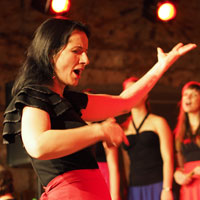
2020 – Ateliér 2

Aven čhajorije!
Choirmaster: Tereza Staňková
Mamo dado
Oda kalo čirikloro
Solnishko
Love, life and death. All in one and one in all. The testimonies of Romani songs are targeted directly to the heart. Once you meet them, they will stay with you forever. The emotions are absolute and powerful – both for the listeners and for the performers. Songs traditional and modern, in incredibly becoming arrangements: come to meet and fall in love.
Tereza Staňková

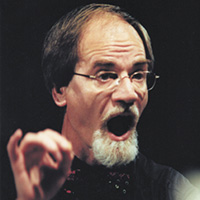
2004 – Ateliér 2

Choirmaster: Helmut Steger
1999 – Ateliér 2

Renaissance music for mixed choir
Choirmaster: Helmut Steger
J. P. da Palestrina - Motette „Ego sum panis vivus“
G. Croce – Missa sexti toni
1992 – Ateliér 2

Choirmaster: Helmut Steger
H. Schütz – O bone Jesu, fili MariaeE. de Cavalieri – O Signor santo e vero
1990 – Ateliér 2

Songs From EC Repertoire
Choirmaster: Helmut Steger
From EC Repertoire
1989 – Ateliér 2

Claudio Monteverdi
Choirmaster: Helmut Steger
Claudio Monteverdi: O PrimaveraClaudio Monteverdi: Sfogava con le stelle
Claudio Monteverdi: Si, ch´io vorrei morire
Helmut Steger

Zuzana Stirská
 The highly experienced and musically disposed singer Zuzana Stirská, who studied music theory at the university in Göttingen, devotes herself mostly to the music genre of "Gospel songs".
The highly experienced and musically disposed singer Zuzana Stirská, who studied music theory at the university in Göttingen, devotes herself mostly to the music genre of "Gospel songs".After her return from emigration (1981-1995) she spent long time preparing her music plan - to set up a mixed twenty-strong choir focused on this kind of music. In 1999 she appeared in the SEMAFOR theatre in the show called Zuzana\'s comeback (Zuzana se vrací) with her GOSPEL TIME. The show got an enthusiastic reception and was followed by regular Gospel Time Parties. The repertoire based on classical gospel was "secularized" by the lyricists Josef Fousek, Jiří Suchý or Ivan Mládek. Zuzana has arranged the traditional gospels herself and supplemented them with several songs of home provenience. Zuzana Stirská not only sings with GOSPEL TIME, but also moderates her performances. She gradually returned to radio studios as well as to TV screens. All this testifies to the understandability and attractivity of this genre, as rendered by Zuzana Stirská and GOSPEL TIME, to the Czech public. This is also confirmed by the growing favourable response of the audience.
Zuzana Stirská\'s singing career is rich and time-tested abroad. After her beginnings in SEMAFOR she sang with various groups and bands, and after leaving to SRN she - under the pseudonym Susanna Prag - soon became poplar there. She gained a good repute of a sought-after singer, won the popular competition Golden Ladder, recorded and performed for radio and TV. She performed with Mike Oldfield, Gunther Gabriel, James Last and other world stars.
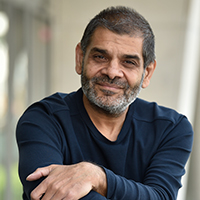
2023 – Ateliér 3

Love in a song
Choirmaster: Josef Surovík
Tereza Surovíková - Harmony of Love
Tereza Surovikova - Sing, Nightingale
Petr Koronthály - Mountains, Mountains - Part 1.
Javier Busto - Segastipean
Philip Stophord - Lully Lulla Lullay
For this studio I have chosen works by contemporary artists, two Czech and two foreign. We will rehearse together two pieces by Tereza Surovíková, Harmony of Love (on the text from Solomon's Song of Songs from the section The Mystery of Love) and an arrangement of the beautiful Slovak folk song Zazpívaj, slavíčku. The second Czech composer will be Petr Koronthály, from whose cycle Hory, hory (Mountains, Mountains) I have selected the eponymous Part 1. The foreign choral composer scene will be represented in our programme by Javier Busto and Philip Stopford. From the successful Basque composer Busto we are treated to the colourful mood piece Sagastipean, and from the British composer Stopford we have the lullaby Lully, Lulla, Lullay, based on a text about the murder of innocents.
Josef Surovík

Je zakládajícím sbormistrem pěveckého sboru Cantica laetitia, který vedl do roku 2022, současně řídí i další pěvecká tělesa (celorepublikový sbor Moraviachor a Sonet Vsetín a Český sbormistrovský sbor). Odborná vzdělání získal na Církevní konzervatoři v Kroměříži. V letech 1998-2004 působil jako sbormistr při Filharmonii Bohuslava Martinů Zlín. V roce 1998 založil dětský pěvecký sbor Cantica Zlín, z jehož absolventů se v roce 2004 utvořilo pěvecké těleso Cantica laetitia. Se svými sbory získává přední ocenění v domácích i mezinárodních soutěžích. (laureát soutěží: Praha,Olomouc, Žilina, Bratislava, IFAS Pardubice. Prijedor-Bosna a Hercegovina, Maasmechelen-Belgie, Varna Bulharsko, Bielsko Biala, Krakow - Polsko, dvě 2. místa - Spittal an der Drau. 3. místo – Llangollen, 3. místo.- Baden) Je často zván, jako lektor sbormistrovských kurzů a porotce národních i mezinárodních sborových soutěžích v České republice i zahraničí. Aktivně se účastnil kurzů AMU Praha (varhanní – Martin Sander, Susan Landale; sbormistrovské – Helmut Frank), sbormistrovských stážích Hochschule der musik Dresden se zaměřením na interpretaci kantát Johanna Sebastiana Bacha (Helmut Riling) a dirigování vokálně instrumentálních děl zaměřených na vrcholný romantismus (Prof Helmuth Rademann). Za dobu svého působení získal Cenu Unie pěveckých sborů – sbormistr – junior (2009), Cenu za příkladnou práci s mládežnickým sborem na FSU Jihlava (2012), Ocenění primátora města Zlína (2014) a Cenu Ferdinanda Vacha (2019). Jedním z jeho projektů byla Dětská opera Zlín (2011-2016), se kterou provedl např. operu B. Brittena Malý kominíček nebo Broučky Václava Trojana. Jiřího Temla Čert a Káči. Je členem odborných rad Nipos-Artama pro dětské sbory a sbory dospělých. Je korepetitorem a dirigentem v Městském divadle. Zlín.
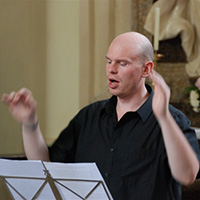
2024 – Ateliér 1

Venetian Mirror
Choirmaster: Čeněk Svoboda
Giovanni Gabrieli - Lieto Godea
Orlando Di Lasso- O la, o che bon eccho!
Tomás Luis De Victoria- Salve Regina
Giovanni Gabrieli - Hodie completi sunt
Jacob Handl - Duo Seraphim
Ludovico Da Viadana - Exsultate justi
In the 16th century, the Doge of Venice used to go to San Marco to pray in front of a huge lump of gold. And the Council of Ten decreed that if an interesting theme came to the organist during the service, the priest must wait until the music was over. The local multi-choir "concerto" was so popular that most European composers adopted the form. And people flocked to San Marco in droves for the concerto. Nowhere else were the conditions better for the birth of baroque music. Come to the studio and be there in person. We'll fill the space together with exultant and sublime music.
2020 – Ateliér 1

The Voice of the Lord dashes the cedars
Choirmaster: Čeněk Svoboda
Historia di Jephte - Giacomo Carissimi
Aller Augen warten auf dich, Herre - Heinrich Schütz
Jauchzet dem Herrn - Felix Mendelssohn Bartholdy
Rock my soul - Richard Jackson
The oratorio form began to emerge around the year 1600, mainly in Rome. First compositions of this kind lacked the ambitions of the masterpieces of supreme Baroque era and later. The first composer using this form was Giacomo Carissimi (1605-1674). His best known oratorio, Historia di Jepthe, is based on several references within the Old Testament about the Jewish king Jephte and his daughter, unnamed in the Bible. The king unknowingly promised to sacrifice her, if the God grants him a victory over the Ammonites. You can learn how it fell out in this atelier, as we will perform the oratorio (about 20 minutes of beautiful music for solo, choir and basso continuo) on Saturday concert. Its final choir is one of the best composition for the choir in the 17th century. At the Sunday concert we will step out of the old music canon while performing the Mendelssohn's psalm Jauchzet dem Herrn and the mysterious piece Sweep My Soul, it will certainly be worth it.
2014 – Ateliér 1

Angel and Nightingale
Choirmaster: Čeněk Svoboda
Clément Janequin (1485-1558): Le Chant des Oiseaux
Hans Leo Hassler (1564-1612): Duo Seraphim
Claudio Monteverdi (1567-1643): Quel Augelin che canta
Jacob Obrecht (1457/58-1505): La tortorella
The world of Renaissance music from bird's as well as angel’s eye view. The conductor and zealous ornithologist will lead you to the realm of those who are not earthbound. Our onomatopoetic feast will not lack seraphim, nor various representatives of bird kingdom. Hopefully not on a plate, but singing…
2008 – Ateliér 2

Choirmaster: Čeněk Svoboda
Čeněk Svoboda
 Čeněk Svoboda was born in 1978 in Liberec, where he also finished his violin studies at elementary artistic school. Already during his studies at the F. X. alda grammar school, he began applying himself intensively to choir singing, and between 1993-1998, he was a member of Liberec mixed chamber choir Rosex. In 1994, Čeněk Svoboda founded an ensemble called Vokální oktet and led the ensemble as artistic director until 2003. Since 2000, he has been the conductor of a grammar-school choir Cum decore in Liberec, and since 2006, he has also been working with another Liberec choir Ještěd, becoming their first conductor in January 2007.
Čeněk Svoboda was born in 1978 in Liberec, where he also finished his violin studies at elementary artistic school. Already during his studies at the F. X. alda grammar school, he began applying himself intensively to choir singing, and between 1993-1998, he was a member of Liberec mixed chamber choir Rosex. In 1994, Čeněk Svoboda founded an ensemble called Vokální oktet and led the ensemble as artistic director until 2003. Since 2000, he has been the conductor of a grammar-school choir Cum decore in Liberec, and since 2006, he has also been working with another Liberec choir Ještěd, becoming their first conductor in January 2007.In Prague, Čeněk Svoboda studied conducting at the Pedagogic Faculty of Charles University under Jiří Kolář and Marek Valášek. As a conductor, he won several awards in domestic and international choirmasters\' competitions. In 2005, the Singing Choirs Union awarded Čeněk Svoboda a national award Junior Conductor. Between 2003-2007, he and the choir Cum decore got a number of awards at major international festivals (Praga cantat 2004, Jihlava 2005, Ifas 2006, Bratislava 2007).
Apart from conducting, Čeněk Svoboda also devotes himself to solo singing (in private lessons with Svatava ubrtová). Lately, he has been singing professionally both as an ensemble singer and as a soloist in leading local and international early music vocal ensembles (Collegium Vocale 1704, Doulce Mémoire, Collegium Marianum, Musica Florea, Ensemble Inégal and others).
Čeněk Svoboda began working with Collegium 419 in spring 2004 and between 2004-2007 he rehearsed and produced a number of great works of early music: complete set of Motets by Johann Sebastian Bach, Officium defunctorum by Tomás Luis de Victoria, Responsories by Jan Dismas Zelenka, Missa quinis vocibus by Kryštof Harant and many others.
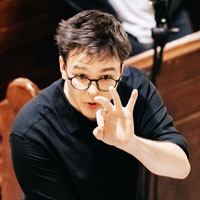
2024 – Ateliér 4

Around the world in 20 minutes
Choirmasters: Igor Karpilovskij, Jaroslav Šindler
Swedish folk - Trilo / Slängpolska efter Byss-Kalle
Haitian folk, arr. Sten Källman / Sten Källman - Papa loko / Rara papiyon
Xhosa folk, arr. Michael Barrett, Ralf Schmitt - Indodana
Bulgarian folk, arr. Khristo Todorov - Svatba
Moravian folk - Ej, jedeme, jedeme
We invite all lovers of musical travel to join us on a sing-along adventure with two wacky guides. A tour full of laughter, touching, rhythmic swaying and, most importantly, general partying awaits us!
Our itinerary will include lesser-known folk songs from different parts of the world in special "bohemian" arrangements.
Igor and Jaroušek are looking forward to seeing you!
Jaroslav Šindler

Jaroslav Šindler Jr. (*1995), as the son of a jazz guitarist, was exposed to music from a very young age, but he only started to actively pursue it when he entered the ZUŠ at the age of 12 (playing the piano). From 2011 he studied jazz piano in Jan Andro's class, under whose guidance he also played in the school band. The experience gained there he has been capitalizing on, among other things, in Anna Julia Slováčková's band, where he has been playing since 2017.
In 2021 he completed his Bachelor's degree at the Czech Technical University (Informatics), in 2023 he graduated from the Jaroslav Ježek Conservatory and College of Music (Composition) under Tomáš Sýkora. He now uses the partial combination of these two fields of study to work as an editor at the music publishing house Bärenreiter Prague. This year he is finishing his Master's degree at the Universität der Künste Berlin (Jazz-Arrangement/Komposition).
Besides playing the piano, he has been involved in choral music for many years. He has performed in the Divertimento choirs (sb. Jaroslava Halamová, Tomáš Klima; the current choir Dábrlíbap is led by Filip Beneš), Beshamonie (choir of Libor Sládek) and Bohemiachor (choir of Vít Novotný). In 2015, he co-founded the male choir HuMuS (formerly Ch-tdž!), which he still leads and with which he won the absolute winner of the Jirkovský písňovar choral festival in 2017. Between 2018 and 2023, he was a member of the vocal ensemble Gentlemen Singers (art. v. Richard Uhlíř), and from 2022-2023 he was guest choirmaster of the Czech gay choir Doodles (sb. Marek Stanka).
Thanks to all this experience, she is currently working with a number of vocal ensembles and choirs - writing arrangements, consulting at rehearsals, etc. In 2022, he led a workshop at the Jirkovské písňovar, where the following year he sat on the expert jury.

2025 – Ateliér 1

Baroque Apotheosis (From the Spanish War of the Giants, French Sailors to the Czech Coronation)
Choirmaster: Marek Štryncl
Johann Joseph Fux - Costanza e fortezza
Sebastián Durón (1660-1716) - Válka obrů, Pues al airado acento
Sebastián Durón (1660-1716) - Válka obrů, Bucentoro de plumas, Fuego
Marin Marais (1706) - Entrée de Matelot
The Baroque apotheosis cannot be without Spanish Baroque music, or rather a theatrical form unknown to us – ZARZUELA, which was inspired by folk music during the Baroque period. And not just any kind. At that time, Spain (thanks to its historical context) literally absorbed Arabic and American rhythms and a bit of foreign melodies into its music. Sacred music was not spared either. Therefore, we will embark on two compositions from the last Baroque Spanish zarzuela, The War of the Giants, written by Sebastián Durón. Next, we will stop at the French naval song Entrée de Matelot by Marin Marais from 1706. And we will end our journey through Europe with several “ballet” choruses from Johann Joseph Fux’s coronation and birthday opera Costanza e fortezza, which was performed in Prague in 1723. Most of them are shorter compositions of various natures.
If someone, in addition to singing, has a good level of playing a musical instrument (which already existed in the Baroque era - string instruments, flutes, oboe, etc.), they can bring it with them. And those who have a decent "rhythm" can come with some percussion instrument. It will definitely come in handy sometimes. Otherwise, you don't have to worry about the Spanish, French or Italian languages ??at all. Their old form is closer to Czech than it is today, and in addition, our primary concern will be the semantic and expressive concept of the proposed musical compositions.
2013 – Ateliér 2

Music of renaissance and baroque masters
Choirmaster: Marek Štryncl
Andrea Gabrielli - Battaglia (Battle)
renaissance songs with Czech and Latin texts:
Když jsi v štěstí (anonym) (If you are fortunate)
Zkusil jsem ve světě mnoho – song by Šimon Lomnický, 1584 (I have tried a lot)
EPINIKIUM - Gratias tibi vovemus
Satirická píseň Jana Adelfa (Satirical song by Jan Adelf)
Henry Purcell - opera FAIRY QUEEN – selection
Ancient music does not necessarily imply repulsive seriousness. The end of the renaissance period and the beginning of the baroque period are a revolutionary story of the emotional potency of texts in music. It is the same with the music of Henry Purcell, whose opera Fairy Queen lets us into his music full of emotions based on natural as well as human elements, or lovely fairy tale stories and legends. The "war" music of A. Gabrielli from the end of the 16th century, that combines new programme elements with old polyphonic style, is a typical example of a collision and at the same time symbiosis of sense and emotion. Seeking them is important for us.
And the baroque guitar that I will have with me will make also the Czech renaissance songs marvellous.
2011 – Ateliér 1

Baroque and Classicism
Choirmaster: Marek Štryncl
Jan Václav Hugo Voříšek (1791-1825) - Offertorium Quoniam iniquitatem
Marc-Antoine Charpentier (1643-1704) - Motet Beatus Vir qui timet
Andrea Gabrieli (1532/1533-1585) - Battaglia
Henry Purcell (1659-1695) - Happy day
H. Purcell - Hear mighty Love
H. Purcell - Rejoice
Apart from choir singers, also soloists for little solo parts are welcome (SATBB). They may sing either solo or in a little “elite” group composed of several solo singers. It depends on the situation on the spot. The French baroque singing is a big unknown in our country. It will sure appeal to the singers and listeners.
For multipart pieces, the conductor will divide singers into voices himself.
2009 – Ateliér 1

High Baroque Music
Choirmaster: Marek Štryncl
Johann Sebastian Bach (1685-1750): Motet "Der Geist hilft unsrer Schwachheit auf" BWV 226Jan Dismas Zelenka (1679-1745): Psalm 125. In convertendo
Johann Caspar Ferdinand Fischer (1656-1746- a rediscovered Czech baroque composer): Rorate a 4
Bach is for two choirs. Zelenka can be performed by two alternating choirs. So it is possible to set one small chamber choir (from solo cast up to 2-4 singers in each voice group) and one bigger choir. Thus it is possible to participate both for experienced ancient music singers and all other interested singers. This solves a problem I met last time - the advanced singers need not feel "unexploited" and the beginners can get their opportunity.
2007 – Ateliér 1

Choirmaster: Marek Štryncl
Marek Štryncl

Conductor, violoncellist, choirmaster, and composer Marek Štryncl (born 1974 in Jablonec nad Nisou) held the position of concert soloist in the North Bohemian Philharmonic already while a student at the conservatory in Teplice. He graduated from the Academy of Performing Arts in Prague (AMU) in 2002 in the field of conducting, he studied cello at the Dresdner Akademie für alte Musik, and participated in many courses in authentic performance practice in Chinon, Mainz, Basel, Valtice, and elsewhere.
As a conductor and choirmaster he cooperated with famous chamber and symphonic orchestras, choirs, ensembles, and soloists, such as Magdaléna Kožená, Phillipe Jaroussky, The New Israeli Vocal Ensemble, Boni Pueri, the Orlando Consort, the Prague Chamber Choir, Les Musiciens du Paradis, and the Prague Philharmonic. His repertoire includes works from the early baroque to the Romantic period, as well as contemporary compositions.
As a result of his interest in authentic performance, Štryncl set up the Musica Florea ensemble in 1992. With Musica Florea he revives the work of forgotten composers, especially from the Czech baroque and classical periods. He prepares the ensemble’s regular concert series in Prague and in other regions of the Czech Republic, and has initiated the unique theatre project of mobile baroque stage called Florea Theatrum. He plays the cello both as a soloist and in chamber ensebmles, and also occasionally composes. He has appeared at prestigious festivals, such as the Prague Spring, Rezonanzen in Vienna, the Festival van Vlaanderen in Brugge, the Tage alter Musik in Sopron, the Tage alter und neuer Musik in Regensburg, Strings of Autumn, and Concentus Moraviae. He has made dozens of compact disc recordings, many of which have received top awards: Diapason in 1994, Zlatá Harmonie in 1997, and a Cannes Classical Award in 2003. He does not avoid even alternative projects - e.g. cooperation with the singer Iva Bittová (Vladimír Godár, Mater, EMC, 2007), or the project of romantic symphonic music played on period instruments (works by Antonín Dvořák, Arta Records, 2009).
At present he is teaching conducting, choir conducting, church music conducting, and baroque cello at Charles University and at specialized courses and workshops (e.g, the International School of Ancient Music at Valtice, Bohemia Cantat in Liberec, Convivium, Academy of Performing Arts in Prague, Janáček’s Academy of Performing Arts in Brno, etc.).
Petr Šumník

Milan Uherek
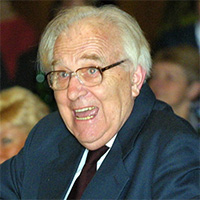
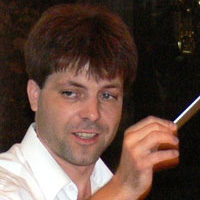
2014 – Ateliér 4

... and you know this one?
Choirmaster: Marek Valášek
(czech modern serious music)
Jan Novák (1921-1984): Exercitia mythologica (Midas, Terpsichore)
Klement Slavický (1910-1999): Madrigaly - 4. Milostný (Romantic)
Jiří Teml (*1935): Masopust (Shrovetide)
Antonín Tučapský (*1928): In honorem vitae - 5. Tu ne quaesieris
I promise beautifully modern and seriously serious music, however, he who would eat the fruit, must climb the tree :-)
I am looking forward!
2012 – Ateliér 3

Treasures of Czech choir music
Choirmaster: Marek Valášek
Antonín Dvořák: Dnes do skoku
Petr Eben: Cantico delle creature
Jan Hanuš: Ave Maria
Jan Novák: Echo z cyklu Exercitia mythologica
Anošt Košťál: Už je slunko
Echo: name of a nymph
A light-voiced nymph, reverberating Echo, can imitate melodies, and teaches us canons and the art of fugue in the shadow of a mountain
Cantico delle creature (A Hymn of Creation) to an old Italian text by Francis of Assisi (1182 - 1226) is a hymn to God-Creator.
Francis invites the Sun, the Earth, the Moon with stars, fire, water and wind to a joint hymn, calling them his brothers and sisters. This is the origin of the Czech equivalent of the name "Song of Brother Sun". Eben proceeds from one music motive and in a masterly manner arranges that motive in characteristic stylizations, and with carefully chosen expressive means achieves onomatopoeic rendering of the natural elements. The listener will note the typical features of the Gregorian chant or of the Italian tarantella. The whole piece is closed in the transparent mirror form.
Cantico delle creature
A Hymn of Creation
Altissimo, onnipotente, bon Signore, tue so'le laude, la gloria e l'honore et onne benedictione.
The highest, omnipotent, good Lord, You deserve praise, glory, honour and every benediction.
Laudato si, mi Signore, cum tucte le tue creature, spetialmente messer lo frate sole, lo qual e iorno, et allumini noi per lui. Et ellu e bellu e radiante cum grande splendore: de te, Altissimo, porta significatione.
Be praised, my Lord, by all Your creation, first of all by your brother Sun, who is the day and through whom you give us light. He is beautiful and bright. In his great brightness he is the image of You, the Highest.
Laudato si, mi Signore, per sora luna e le stelle: in celu l'hai formate clarite, pretiose et belle.
Be praised, my Lord, by your sister Moon and stars. You created them bright, precious and beautiful in the sky.
Laudato si, mi Signore, per frate vento et per aere et nubilo et sereno et onne tempo, per lo qual´ alle tue creature dai sustentamento.
Be praised, my Lord, by your brother wind, air, cloud, bright sky and each weather through which you give your creatures food.
Laudato si, mi Signore, per sora acqua, la quale e molto utile et humile et casta.
Be praised, my Lord, by your sister water which is very useful, humble, precious and clear.
Laudato si, mi Signore, per frate focu, per lo qual´ ennallumini la nocte; ed ello ebelloet robustoso et forte.
Be praised, my Lord, by your brother fire through which you make night light. He is beautiful, playful, strong and powerful.
Laudato si, mi Signore, per sora nostra matre terra, la quale produce diversi fructi con coloriti flori et herba.
Be praised, my Lord, by our sister, mother Earth that feeds us and gives all kinds of fruits, colourful flowers and plants.
Laudato si, mi Signore, per sora nostra morte corporale, da la quale nullo homo vivente po skappare.
Be praised, my Lord, by our sister physical death that nobody can escape.
Laudate e benedicete mi Signore et rengratiate, servitelo cum grande humilitate.
Praise my Lord and be grateful to him, thank him and serve him with great humbleness.
2009 – Ateliér 2

Bohuslav Martinů
Choirmaster: Marek Valášek
Romance z pampelišek (Romance From The Dandelions) - cantata for mixed choir a capella and soprano solo.Marek Valášek
 Marek Valášek specializes in performing vocal-instrumental pieces. "The synthesis of the vocal and the instrumental element is for me the most fitting form of interpreting the authors\' message - the deep meaning of words enhanced by music. I aim at as intensive interpretation as possible, to leave an inerasable trace in the audience, an experience, to draw the audience into the centre of events, into the drama that is performed in front of them, but that involves them at the moment. Let us not degrade a concert only to an act of exhibition, music is an enormous secret. Anyone, who keeps seeking sincerely, will find."
Marek Valášek specializes in performing vocal-instrumental pieces. "The synthesis of the vocal and the instrumental element is for me the most fitting form of interpreting the authors\' message - the deep meaning of words enhanced by music. I aim at as intensive interpretation as possible, to leave an inerasable trace in the audience, an experience, to draw the audience into the centre of events, into the drama that is performed in front of them, but that involves them at the moment. Let us not degrade a concert only to an act of exhibition, music is an enormous secret. Anyone, who keeps seeking sincerely, will find."
In 1996 he set up the ensemble Picollo coro & Picolla orchestra and has been its director so far. The ensemble is regularly invited by the Czech Radio to participate in recording, by the Department of Composition at Academy of Music, and by the Association Přítomnost, to premiere new pieces. The ensemble was awarded the prize of the B.Martinů Foundation and in 2007 it won the main prize of Petr Eben at the International Festival of Advent and Christmas Music. Picollo coro & Picolla orchestra have also toured a lot abroad (Germany, Italy, Croatia). As part of the project "Faculty in the Heart of Karlov" organized by the 1st Faculty of Medicine, they have realized great oratorios, e.g. Handel\'s Messiah, Mozart\'s Requiem, Mendelssohn\'s Elias, Dvořák\'s Stabat Mater, Poulenc\'s Stabat Mater, etc.
MgA. & Mgr. Marek Valášek, Ph.D. (1969) graduated from the Prague Academy of Music majoring in conducting and has obtained doctor degree. During his studies he was engaged by the Municipal theatre in Ústí nad Labem. In 2002 - 2006 he was choirmaster in the State Opera in Prague, where he - apart from his choirmaster\'s work - also conducted the opera La Boheme by R.Leoncavallo. In 2002 he won the first prize in conducting competition at the festival Young stage for a concert with the Czech Philharmonics. In 2005 he performed the oratorio Ecce Homo by Jan Hanuš in the Czech premiere at the festival Prague Spring. In November 2005 he recorded Hanuš\'s I. symphony with the Czech Radio Symphonic Orchestra. In 2006 he was as guest in Vilnius (Lithuania) and Kyoto (Japan). Re cooperates with the Hradec Králové Philharmonics on regular basis, he is invited to lead choirmaster courses and to work in juries in choir competitions. He teaches at the theory department of the Prague Conservatory of Music and is choirmaster of all Conservatory choirs. Since 2002 he has been teaching choirmaster specialization at the Faculty of Pedagogy at Charles University in Prague.

2018 – Ateliér 1

Ay Santa Maria or Indian baroque
Choirmaster: Roman Válek
O Virgo splendes - Spanish anonym, SATB ,bell
Ay Santa Maria - Spanish anonym, SATB a capella
Virgen bendita sin par - Pedro Escobar, SATB, baroque guitar, percussion
Dios Itlaconntzine - Codex Valdés, SATB, S solo, baroque guitar, percussion
Sancta Maria - Codex Valdés, SSATB, baroque guitar, percussion
E la don, don - Anonym, SATB, baroque guitar, percussion
The conductor will speak Czech and English.
Dear singers.
Our workshop will be a short trip to less known vocal music of renaissance and baroque Spain and New Spain, i.e. South America.
One of the most important sources of this beautiful music is the so called Llibre Vermell de Montserrat („Red book of Montserrat“) and of course the golden age of Spanish renaissance polyphony represented by Vittoria and Morales.
Spanish priests and missionaries – often excellent musicians – studied original languages and helped to create kind of Indian „Esperanto“ - NAHUATL – i.e. the language in which the fusion of the renaissance and baroque Spanish and Indian music took place.
The revelation of Virgin Mary to the Indian Juan Diego in Guadelupe was the turning point in the evangelisation of Amerika. From 1532 to 1538 nine million Indians – Mexicans converted to Christianity.
Our programme will contain both Spanish music – as the basis of the fusion – and original Spanish-Indian music performed in Mexico at the turn of the 17th century.
We will sing in Spanish Latin and, primarily, in the mysterious Indian language NAHUATL.
Our workshop will be accompanied by two members of Czech Ensemble Baroque- on baroque guitar and historical percussion.
Apart from singing you can enjoy percussions yourselves – if you manage to get some Indian percussion instruments before Summer. So bring conches, shells, husks, cocoa beans, cactus thorns, microdrums and other Mexican instruments that your must have in ample quantity at home, left from your travels.
Our workshop also presupposes authentic image, so do not forget to bring headbands, feathers, fluff, piece pipes and clay.
Your tribal chief VELKÝ VÁLEK is looking forward to you.
2014 – Ateliér 5

Vladimír Franz Live
Choirmaster: Roman Válek
Vladimír Franz (*1959): The second part of the pocket oratorio "Young Men in the Stew".
A creative workshop in the presence of the neo-renaissance artist Vladimír Franz.
2012 – Ateliér 1

Vivaldi - Magnificat RV610
Choirmaster: Roman Válek
Antonio Lucio Vivaldi (1678-1741):
Magnificat (RV 610)
Vivaldi as a composer of vocal music composed a lot of cantatas and operas. Nowadays we are experiencing the renaissance of his vocal-instrumental music. Similarly as J.S.Bach in the saint-Thomas school inLeipzig, also Vivaldi composed most his pieces, including the operas for Ospedale della Pieta, inVenice. His Magnificat RV 610 can be included among his pieces shorter in size, but not lacking anything of the author’s genius. The orchestral accompaniment in the concerto style combines marvellously with beautiful but not too polyphonic choirs, and all this is completed with short solo passages. You can take part in a competition for the solo parts S, A, T, probably the second rehearsing day. The choir will be accompanied by members of The Czech Ensemble Baroque Orchestra composed of 2 violins, a viola, a violoncello, a contrabass, a harpsichord, 2 oboes and possibly a bassoon, all period instruments. You can find the piece on YouTube for easier study.
I with you discovered a completely different Vivaldi in our workshop than that you know from “The Four Seasons”. I suppose our concert will be included in the sacred concert on Saturday. I am looking forward to our joint baroque masterpiece.
Yours Roman Válek
2010 – Ateliér 3

Inspiration by orthodox music (contemporary Czech creation)
Choirmaster: Roman Válek
Martin Jakubíček (*1965)- Marie (written for Slavonic Epic) for SSATB and four-handed piano
„Marie by Martin Jakubíček was composed for Znojmo Music Festival 2009 for The Czech Ensemble Baroque Vocal Quintet and duo Ardašev, who premiered the piece in July 2009 (see www.hudbaznojmo.cz) It is composed for S MzS A T B accompanied by four-handed piano. The composition testifies to enormous erudition and talents of the composer – organist – improviser, and immediately arouses interest by its refined sound, miniature magnificence and roots reaching from orthodoxy to Janáček, Martinů and perhaps also Tučapský or Eben. It seems well manageable for our workshop, utilizing all attributes of a big choir and I hope it will sound well at the final concert. The overture for choir is a smaller composition (composed for Bohemia Cantat) – its shape is still fully in the hands of our Lord and the author – let us be surprised.”
Roman Válek
2007 – Ateliér 3

Choirmaster: Roman Válek
2005 – Ateliér 2

Choirmaster: Roman Válek
2003 – Ateliér 3

Choirmaster: Roman Válek
2001 – Ateliér 4

Carl Orff vocal works
Choirmaster: Roman Válek
Carl Orff - Stücke für Sprechchor
1999 – Ateliér 1

Petr Eben - Missa con populo
Choirmaster: Roman Válek
Petr Eben – Missa con populo
1997 – Ateliér 1

Choirmaster: Roman Válek
Bohuslav Martinů – The Romance of the DandelionsRoman Válek

Roman Válek is a graduate of the Janáček Academy of the Music and Performing Arts in Brno, where he studied the conducting of vocal & instrumental music. As a student, he completed H. Rilling's course in conducting on "Bachakademie" offered by the Czech Philharmonic Orchestra. Included among his musical achievements in Europe are his collaborations with eminent conductors J. Bělohlávek, G. Albrecht, R. Gandolfi, T. Shimada, G. Gelmetti, F. Bruggen, as well as the most prominent Czech choirs. He has performed with many vocal and instrumental groups, including the Brno Academic Choir, Ars Brunensis Chorus, Madrigal Quintet Brno, Prague Chamber Orchestra, Choir of the National Theatre Opera in Prague and Brno, Chamber Orchestra of the Slovak Philharmonic Orchestra - Musica Aeterna, Brno Chamber Orchestra, B. Martinů Philharmonic Orchestra Zlín, North Bohemian Philharmonic Orchestra Teplice, and The Group Hradišťan.

2023 – Ateliér 1

Lux aeterna
Choirmaster: Tereza Válková
Tomás Luis de Victoria (1548–1611): Lux aeterna
Eriks Ešenvalds (* 1977): Lux aeterna
Giovanni Francesco Annerio (1569–1630): Lux aeterna
Maurice Duruflé (1902–1986): Lux aeterna (with a big organ!)
Jakub Kubín (* 1991): In Paradisum
"...and let eternal light shine upon them" full of hope, combining Renaissance, Baroque and contemporary.
Lux aeterna, an antiphon for communion, which is part of the requiem, a mass for the dead. While this might seem to be a somber to depressing theme, the opposite is true. The Lux aeterna is the most hopeful part of the entire funeral Mass. Its message is one of mercy, and it abounds with the deep feeling that has inspired composers for centuries to create compositions full of light and fragile beauty.
Tereza Válková

She was born in Trebic. After studying at the Brno Conservatoire (piano) she continued her studies in solo singing at the Academy of Early Music in Brno and choir conducting at Charles University in Prague under Jiří Kolář and Marek Štryncl (Gregorian chant under David Eben). Then she studied solo singing at the Faculty of Arts of the University of Ostrava. She is a graduate of many courses in early music performance.
As a member and soloist of many vocal ensembles she has sung in concerts and competitions all over Europe (Italy, Poland, Germany, Austria, Ireland, France, etc.). She is mainly engaged in the period-informed interpretation of music of older styles.
Since 2007, she has been the principal choral director of the Czech Ensemble Baroque, under the banner of which she founded a vocal quintet specializing in high vocal polyphony and madrigal music of the 17th century. In 2017, the Quintet premiered Lukáš Hurník's madrigal cycle Last Summer with Juliet and was the first in the Czech Republic to make a successful debut video for Monteverdi's madrigal Io mi son giovinetta.
As a choirmaster, she has staged a variety of Renaissance, Baroque and Classical vocal-instrumental works, including stage opera productions, as well as purely vocal and a capella programs. The Czech Ensemble Baroque, under the direction of Tereza Válková, has been praised especially for its dynamic expression, the soloistic potential of its individual members and its considerable artistic flexibility. This is also the reason why the choir is able to effectively apply itself in 20th and 21st century works (Orff: Catulli Carmina, Stravinsky: Svaděbky, Martinů: Kytice, Fleischer: Adappa - world premiere opera, Mansurjan: Requiem - Czech premiere, Bernstein: Mass, etc.).
Together with her ensemble, Tereza Válková has taken several workshops with the famous vocal group The King's Singers and individual lessons with Paul Phoenix and Robin Tyson. In addition to her home orchestra, the Czech Ensemble Baroque, the vocal ensemble has also performed and recorded with Musica aeterna Bratislava, the Brno Philharmonic, the Olomouc Philharmonic, the Dama Dama ensemble, the B-Side Band with Vojtěch Dyke, and the Berlin Akademie für Alte Musik.
The ensemble has made numerous recordings for Supraphon, Pentaton music (NE), Evidence classic (FR), European Broadcasting Union, Czech Radio, Czech Television, etc. Since 2008 Tereza Válková has been a lecturer of the choral class at the Summer School of Baroque Music.
Tomáš Vespalec
 I am sending my best regards to all fans of choir singing. Most of you may not know me - I am going to be one of the workshop leaders at Bohemia Cantat only for the first time this year. I live in Hradec Králové, where I work as a teacher at the music school (ZU Na Střezině) and where I also lead a small choir (Hradecké komorní tucteto). I do not consider myself to be a "full-blooded" choirmaster although I have gained some know-how in this sphere (by studying choirmastery at professor Jiří Skopal). Beside conducting a choir, I also try to make arrangements of musical pieces in various genres and from time to time I also compose a piece or two of my own (not necessarily for a choir). Considering, I have chosen several of my arrangements for this year\'s workshop at Bohemia Cantat. Well, that should do about myself, I think. I am looking forward to meeting you in Liberec.
I am sending my best regards to all fans of choir singing. Most of you may not know me - I am going to be one of the workshop leaders at Bohemia Cantat only for the first time this year. I live in Hradec Králové, where I work as a teacher at the music school (ZU Na Střezině) and where I also lead a small choir (Hradecké komorní tucteto). I do not consider myself to be a "full-blooded" choirmaster although I have gained some know-how in this sphere (by studying choirmastery at professor Jiří Skopal). Beside conducting a choir, I also try to make arrangements of musical pieces in various genres and from time to time I also compose a piece or two of my own (not necessarily for a choir). Considering, I have chosen several of my arrangements for this year\'s workshop at Bohemia Cantat. Well, that should do about myself, I think. I am looking forward to meeting you in Liberec.
2023 – Ateliér 5

Singing around the world
Choirmaster: Josep Vila Jover
Michael Engelhardt - Gaudete
Gunnar Erikkson - Gjendines Badnlat
Lluis Ma Millet - La sardana de l’abril
James Erb - Shenandoah
Alberto Grau - Son de la loma
Popular music is the real culture and the soul of every contry around the world. In this workshop we are going to know and sing some of this nice popular songs. Join us and enjoy it! Lets sing together!
2019 – Ateliér 4

Songs from Catalonia
Choirmaster: Josep Vila Jover
Josu Elberdin - Segalariak
Josep M. Ruera - Sant Joan
Josep Cumellas Ribó - L'hereu Riera
Josep Vila i Casañas - Laudate Dominum
Javier Busto & Matías Antón Mena - A tu lado
Pablo Casals - O vos Omnes
Josep Vila Jover

Born in Granollers in 1970, he studied choral conducting with Enric Ribó, Conxita Garcia and Christian Grube. Since 1995, he has been the artistic director of the Societat Coral Amics de la Unió, a prestigious choir school in Granollers that has more than six hundred and fifty students and ten active choirs.
In this institution, he conducts VEUS - Cor Infantil Amics de la Unió - formed by 60 white voices between 12 and 18 years old - and the Cor de Cambra de Granollers, a mixed choir of 40 members. Both choirs are resident formations at the Teatre Auditori de Granollers since 2017.
These choirs have performed in the stable seasons of the Palau de la Música Catalana, L'Auditori de Barcelona and the Gran Teatre del Liceu, where he has collaborated with renowned conductors such as Edmon Colomer, Jordi Savall, Lluís Vilamajor, Robert King, Manel Valdivieso, Álvaro Albiach, Pablo González or Rubén Gimeno. He also regularly conducts international concerts and tours, all over Europe and from August 2017 also outside the continent.
He is regularly invited as a conductor to workshops and international choral festivals. Among the last participation we can highlight the EUROTREFF 2017 festival in Wolfenbüttel (Germany), Europa Cantat 2018 in Tallinn (Estonia), where he did a workshop with the Hungarian director József Nemes or the 6th Choir Meeting "El Canto Nos Une" in Colombia the September 2018.
Zdeněk Vimr
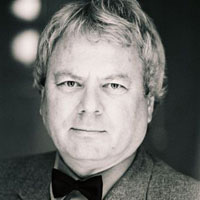 The conductor Zdeněk VIMR (1952) is an associate professor at the Department of Music Culture of the West Bohemian University in Pilsen. At the same time he is choirmaster in the Pilsen opera, where he has prepared over 40 stage productions and several independent choir concerts.
The conductor Zdeněk VIMR (1952) is an associate professor at the Department of Music Culture of the West Bohemian University in Pilsen. At the same time he is choirmaster in the Pilsen opera, where he has prepared over 40 stage productions and several independent choir concerts.He is often invited to the juries of national as well as international competitions (Gorizia-Italy, Prague - Advent and Christmas music festival where the Petr Eben Prize is awarded, Prague Christmas, etc.). He has conducted several choir workshops, made many recordings for the radio, especially recordings of contemporary choir pieces. He is a respected expert on the choir works of Zdeněk Lukáš, several of which he has premiered. He has made four profile CD\'s with the choir Česká píseň. With the choir Nová Česká píseň he become the absolute winner of the national competition of chamber mixed choirs at the FSU in Jihlava, and in 2000 the choir won the international competition at the same place as well. Since 2006 he has been the main guarantor of the new branch of study, choir conducting, set up at the West Bohemian University.

2010 – Ateliér 6

Spirituals and gospels
Choirmaster: Raymond Wise
This Is The Day - composed by Arvis Strickling-JonesLord I Love You, Yes I Do - composed by Raymond Wise
I Opened My Mouth To The Lord - composed by arranged by Raymond Wise
Make A Joyful Noise - composed by Raymond Wise
He’s Counting On You - composed by Raymond Wise
Shine Thee Light - composed by Raymond Wise
Raymond Wise

Rev. Raymond Wise, Ph.D., began his musical career at the age of three, singing gospel music with his family singing group "The Wise Singers." He was educated through the Baltimore City Public School System and graduated second out of class of 500 from the Paul Laurence Dunbar Community High School in 1979. He then went on to Denison University (Granville, Ohio) where he reorganized the Black Student Union Choir, started the Black Student Union Ensemble and Dance Company, and earned a B.F.A. in Music. Rev. Wise was awarded a Graduate Fellowship from the Ohio State University in Columbus, Ohio where earned his Masters in Music Education and Ohio Teacher's Certification. In addition he also completed a Doctorate in Music Education at the Ohio State University for which his dissertation topic is "Defining African American Gospel Music by Tracing its Historical and Musical Development from 1900 to 2000."
Raymond Wise has directed more than 30 choirs during his career and has prepared choirs to perform for national recording artists such as Kenny Rogers, Diana Ross, Yolanda Adams, Tramaine Hawkins, Wintley Phipps, and others. Wise served as the Chorus Master for the world premiere of the Opera Columbus Production of Leslie Burr's "Vanqui" and Assistant Chorus Master for the Opera Columbus Production of "Aida".
As a composer Wise has penned more than 500 compositions that have been performed and recorded by local, national, and international recording artists. Some of his notable works include “Afro-American Suite” written for Bass-Baritone and Chorus. Wise co-wrote the script for “God What Color Is Trouble” with director Ron Pitts and has written the music for more than 20 original musical theater productions, including Dwight Collin’s “Dark Symphony,” the Samuel S. Davis production of “The Snow Queen,” and the Amera-flora production of “Listen With Your Heart.” He also composed the musical score for the children’s opera “Barefoot.”
In 2003 Dr. Wise released the Raymond Wise Choral Sheet Music Series, through which more than 100 of his Gospel, Spiritual, and Choral arrangements are available. In 2004 he released an anthology of Spirituals entitled 21 Spirituals for the 21st Century that features 21 of his concert spiritual arrangements. This collection has been praised and performed by choirs all across the nation. Since releasing the 21 Spiritual's collection Dr. Wise has received commissions to compose original works for the Penn State University Spiritual's Festival, The American Spiritual's Ensemble and the Hartwick College International Choral Festival, which was held in honor of Moses Hogan in Prague in summer of 2008. Raymond Wise is knows locally thanks to Hartwick College where he led to gospel festivals in 2008 and 2009.
Raise established The Center For The Gospel Arts in 1989 to provide educational training for gospel artists and the community. He has developed specialized curriculums in the gospel arts and texts for this school, which offers numerous classes per week, and has served over 5000 since its opening.
Rev. Wise presently instructs courses in Gospel Music and conducts Gospel ensembles at The Ohio State University, Denison University, Trinity Lutheran Seminary, and the Columbus School for Girls.
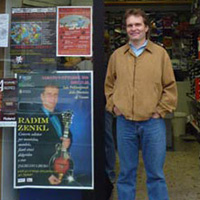
2022 – Ateliér 4

Bluegrass
Choirmasters: Kamila Zenklová, Radim Zenkl, Ondra Kozák
In the Pines (American traditional)
Beautiful Life (William M. Golden)
Body and Soul (Virginia Staufer)
This Heart of Mine (Steven F. Brines, Jim Smoak)
Rocky Top (Felice and Boudleaux Bryant)
Thirsty in the Rain (Peter Rowan)
A vocal cross-section of bluegrass history from its beginnings in the mountain music of the Appalachian Mountains, through the influences of English, Irish and Scottish traditional songs, blues, gospel to contemporary styles. The term bluegrass as a musical style is derived from the name of the band Bluegrass Boys, which was founded in 1939 in Kentucky by Bill Monroe, inspired by the name of their state plant, Kentucky Bluegrass (Poa pratensis), a bluish prairie grass.
Bill Monroe is considered the father of bluegrass. More than 150 musicians played in his band Bluegrass Boys during its existence, many of whom then continued with their own bluegrass bands. It is remarkable that bluegrass is very popular in the Czech Republic, probably following the tradition of Czech unique 'tramp music' and country music.
Bluegrass will be heard for the first time in the Bohemia Cantat studios. Most of the songs will be accompanied by Radim, Ondra and other guest players on typical bluegrass instruments, such as guitar, mandolin, banjo, violin, dobro and bass. A rich variety of songs awaits us, from the traditional bluegrass roots through the heartfelt ballads to the songs at captivating tempos, where we will feel the uplifting energy known as 'bluegrass drive'.
Radim Zenkl & Ondra Kozák
Czech-American Radim Zenkl founded this musical duo with Ondra Kozák as his European concert project. Listeners can look forward to tunes and songs from both players' own works, supplemented by bluegrass, swing, Celtic and 'world music' traditionals in special arrangements. They will perform at the Bohemia Cantat's concert on Friday in the first part of the program.
zenklkozak.com
facebook.com/zenklkozak
instagram.com/zenklkozak
2018 – Ateliér 5

Word from travels
Choirmasters: Michal Hájek, Radim Zenkl
Aj, dobre je (folk song, arr. Michal Hájek)
V hoře (Radůza, arr. Michal Hájek)
Ayibobo (folk song from Haiti, arr. Sten Källman)
Revival (Radim Zenkl – author's composition for mandola and choir)
Každý si nese své břímě (Jarek Nohavica, arr. Michal Hájek)
Marie (Zuzana Navarová, arr. Dana Houdková/Michal Hájek)
The conductor will speak Czech and English.
Dear song-people,
Our workshop is meant for those who are – apart from regular work in choir – not afraid to experiment, improvise, and throw away sheet music and sing between the lines. It means singers who have itchy feet, and fancy jumping into the unexplored ocean of music and exploring its backwaters. We ourselves do not know how this all will turn out, because we might arrive at dead end. We, however, are tempted to taste the power of our precious gathering and joint discovering. We will avoid neither a bit of roister, nor a bit of emotion.
The workshop will be conducted by Michal Hájek, and visited by Radim Zenkl, who will embellish our performance with his multi-instrumental magic.
We will be honoured for at least the short time at Bohemia Cantat to link our ways with yours!
With heartiest greetings,
Michal Hájek and Radim Zenkl
2011 – Ateliér 3

Music of 6 continents
Choirmasters: Kamila Zenklová, Radim Zenkl
The Drunken Sailor (Europe), arr. Robert Sund
Sej, haj, liba (Europe)
Mo Li Hua (Asia), arr. Kamila Zenklová
Talk about suffering (North America), arr. Radim Zenkl
Prende la vela (South America)
Thula mtwana wami (Africa), arr. Markus Detterbeck
Molweni (Africa), tradicionál, arr. Markus Detterbeck
Kookaburra (Australia), Marion Sinclair (1895–1988), arr. Radim Zenkl
Our workshop presents folk songs from all inhabited continents. Each of the songs has its individual character and style – from the lively South American Prende la Vela via two rhythmical African songs to the Australian Kookaburra imitating the traditional didgeridoo in male voices. Asia is represented by the pentatonic Chinese song Mo Li Hua, and Europe by two songs in less traditional arrangements. Most of the songs will be accompanied by Radim Zenkl, an exceptional player of the mandolin, folk flutes and didgeridoo.
Radim Zenkl

was born in Opava, in the 80's he played in the Ostrava groups Athabasca and Rozkol. In 1985, he founded and led the group Tyrkys (Turquoise), which won the Porta competition in 1988. In the summer of 1989 moved to the United States of America, where in 1992 he won the prestigious all American mandolin competition with an international participation, the 'Winfield Mandolin Championship'. He recorded nine solo CDs, worked as a studio player on more than 60 other CDs, and invented a special mandolin technique in which the mandolin sounds like two. He collaborates in concert and studio with players of the new acoustic music scene such as Béla Fleck, Jerry Garcia, David Grisman, Mike Marshall, Jerry Douglas, Stanley Jordan and others. During his visit to Ireland in 1999, he also began playing traditional Irish flutes and gradually other flutes from around the world. Radim has appeared on the stages of many countries on all continents and regularly visits the Czech Republic, where, in addition to his solo performances, listeners had the opportunity to hear him in collaboration with players and groups such as: Druhá tráva, Buty, Čechomor, Jiří Stivín, Vlasta Redl, Hradišťan, The Eben Brothers, Vladimír Mišík, Vladimír Merta, Karel Plíhal, Waldemar Matuška, and in the TV shows Gejzír, Na plovárně, Noc s Andělem and others. He has arranged several compositions for flute and choir, which were performed at joint concerts with Bohemiachor in the Czech Republic and on tour in Ireland. At Bohemia Cantat, he was the assistant choirmaster and a performer in Kamila Zenkl's (sister-in-law) studio 'Music of the Six Continents' (2011) and in Michal Hájek's studio 'News from the Road' (2018). More information at www.zenkl.com.
You Tube - Radim and Bohemiachor:
http://www.youtube.com/watch?v=1-T1dHGU-2g
http://www.youtube.com/watch?v=JE4DNU4dvEg
http://www.youtube.com/watch?v=gAwsafbRbDc

2024 – Ateliér 2

Forgetfulness
Choirmaster: Kamila Zenklová
Josef Říha - Sanctus
Roman Cejnar - Tajná láska
Jiří Teml - Vanitas
Ctirad Kohoutek - Hněvám sa ja, hněvám
Ctirad Kohoutek - Nevybírej, nepřebírej
Ctirad Kohoutek - Laštověnka lítá
Jan Vičar - Spala som na seně
Otmar Mácha - Maryánek
Let's stir up the slowly settling dust in the music closet and rediscover the lesser-known gems of 20th century Czech music. Happy and sad, serious and frivolous. And maybe we will rediscover some forgotten Czech stars.
2022 – Ateliér 4

Bluegrass
Choirmasters: Kamila Zenklová, Radim Zenkl, Ondra Kozák
In the Pines (American traditional)
Beautiful Life (William M. Golden)
Body and Soul (Virginia Staufer)
This Heart of Mine (Steven F. Brines, Jim Smoak)
Rocky Top (Felice and Boudleaux Bryant)
Thirsty in the Rain (Peter Rowan)
A vocal cross-section of bluegrass history from its beginnings in the mountain music of the Appalachian Mountains, through the influences of English, Irish and Scottish traditional songs, blues, gospel to contemporary styles. The term bluegrass as a musical style is derived from the name of the band Bluegrass Boys, which was founded in 1939 in Kentucky by Bill Monroe, inspired by the name of their state plant, Kentucky Bluegrass (Poa pratensis), a bluish prairie grass.
Bill Monroe is considered the father of bluegrass. More than 150 musicians played in his band Bluegrass Boys during its existence, many of whom then continued with their own bluegrass bands. It is remarkable that bluegrass is very popular in the Czech Republic, probably following the tradition of Czech unique 'tramp music' and country music.
Bluegrass will be heard for the first time in the Bohemia Cantat studios. Most of the songs will be accompanied by Radim, Ondra and other guest players on typical bluegrass instruments, such as guitar, mandolin, banjo, violin, dobro and bass. A rich variety of songs awaits us, from the traditional bluegrass roots through the heartfelt ballads to the songs at captivating tempos, where we will feel the uplifting energy known as 'bluegrass drive'.
Radim Zenkl & Ondra Kozák
Czech-American Radim Zenkl founded this musical duo with Ondra Kozák as his European concert project. Listeners can look forward to tunes and songs from both players' own works, supplemented by bluegrass, swing, Celtic and 'world music' traditionals in special arrangements. They will perform at the Bohemia Cantat's concert on Friday in the first part of the program.
zenklkozak.com
facebook.com/zenklkozak
instagram.com/zenklkozak
2019 – Ateliér 2

Woman in a song
Choirmaster: Kamila Zenklová
Erti nachvit seminaris (Georgian)
Što j pa moru (Belarusian)
Drak (Irish)
Bröllopsvisa efter Kirsten (Swedish)
Der Glöggaijoder (Austrian)
Vyhorela lipka (Slovak)
A woman is our guide throughout the whole life. She gives us life, teaches us our first steps and words, patiently raises us, treats our wounded knees. Sometimes with a sharper word evaluates our adolescent ideas, but also hugs us when we need it, or comforts our disappointment from our first love. She stands by us when hardship strikes in life, but can be also a gentle etheric being, avoiding grasp as easily as butterfly wings. Tough life can turn a wise counselor with silvery hair into a witch, cursing the whole world.
Different cultures, different values, yet the same stories. This will be our women workshop.
2016 – Ateliér 5

Vlasta Redl in songs
Choirmaster: Kamila Zenklová
All who like songs by Vlasta Redl, can sing them in arrangements for mixed choir and percussion. Moravian rhythmicity, vivacity and melodiousness - that's a challenge!
Choir arrangements of folk songs by Vlasta Redl:
Ej, dudy moje
V hornom dolnom konci
Moc dobře vím
Kolem a kolem
Vracaja sa dom
2011 – Ateliér 3

Music of 6 continents
Choirmasters: Kamila Zenklová, Radim Zenkl
The Drunken Sailor (Europe), arr. Robert Sund
Sej, haj, liba (Europe)
Mo Li Hua (Asia), arr. Kamila Zenklová
Talk about suffering (North America), arr. Radim Zenkl
Prende la vela (South America)
Thula mtwana wami (Africa), arr. Markus Detterbeck
Molweni (Africa), tradicionál, arr. Markus Detterbeck
Kookaburra (Australia), Marion Sinclair (1895–1988), arr. Radim Zenkl
Our workshop presents folk songs from all inhabited continents. Each of the songs has its individual character and style – from the lively South American Prende la Vela via two rhythmical African songs to the Australian Kookaburra imitating the traditional didgeridoo in male voices. Asia is represented by the pentatonic Chinese song Mo Li Hua, and Europe by two songs in less traditional arrangements. Most of the songs will be accompanied by Radim Zenkl, an exceptional player of the mandolin, folk flutes and didgeridoo.
Kamila Zenklová

After graduating from the Conservatory of Music in Teplice (violin – 1996, and conducting – 1998), she studied choir conducting under prof. L. Mátl (2003) and orchestra conducting under doc. E. Skoták (2006) at the Janáček Academy of Performing Arts in Brno.
During her studies she was cooperating with various professional and amateur ensembles, e.g. with the Academic Choir of Brno, the Teplice Conservatory orchestra, the Janáček orchestra of the Janáček Academy, the Moravian Plilharmonic Olomouc, and the Brno Philharmonic.
In 1994-2000 she was working with the children’s choir CAMELLA in Nový Bor. Since 1999 she has been conducting and regularly performing with the mixed choir VOKÁL Přerov and took golden and silver band places in the international competition Svátky písní Olomouc. In 2002-2004 she was conducting the mixed choir Lumír in Brno. In 2003-2010 she was choirmaster of the children’s chamber choir Kolibříci at the J.G.Mendel’s Comprehensive School in Brno. Since 1998 she has been teaching violin and singing at various Basic Schools of Performing Arts. Since 2006 she has also been teaching music theory and conducting a big choir at the Conservatory of Music in Brno. Since 1999 she has been choirmaster of a special choir Sebranka, specializing in new methods of teaching singing to adult non-singers.
Her interest in music is realized not only through teaching, but also through active performance. She is member of the countrywide choir Bohemiachor and of several smaller ensembles (violin, singing, piano).
Sylke Zimpel
 Sylke Zimpel (born in 1959 in Dresden in Germany), she studied musical composition in her native city and 10 years later she started to study choirmastery in Weimar and later also in Lyon. Since 1986, she has been a "free-lance" composer and choirmaster (Chorbühne TRITONUS Dresden; Femmes Vocales Dresden) and she also gives courses for choirmasters and teachers (her favourite topics range from choirmastery techniques and experimenting in the choir up to Jewish songs in Yiddish).
Sylke Zimpel (born in 1959 in Dresden in Germany), she studied musical composition in her native city and 10 years later she started to study choirmastery in Weimar and later also in Lyon. Since 1986, she has been a "free-lance" composer and choirmaster (Chorbühne TRITONUS Dresden; Femmes Vocales Dresden) and she also gives courses for choirmasters and teachers (her favourite topics range from choirmastery techniques and experimenting in the choir up to Jewish songs in Yiddish).
During those 20 years of composing, she has created over 300 songs for various types of choirs. With unique mastery and passion, she arranges Jewish, Moravian, Latvian and other East European folk songs.
Sylke Zimpel has won a number of prizes in competitions for composers of choir music.
"...Composing and conducting a choir are two inseparable activities. From practice I know very well how a song can sound, what will work and what is feasible, yet I also like to experiment with my choirs all the time. When composing a choir piece, I do my best to refine each voice so perfectly as if it were an independent melody."
Tomáš Židek
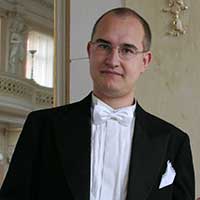
MgA. Židek Tomáš, Ph.D.Tomáš Židek (born 1981) graduated from Grammar School Chrudim and Pardubice Conservatory, where he studied viola, organ and mainly conducting. He continued in his studies at Academy of Performing Arts in Prague, where he graduated with Master’s Degree in 2009 and continues in pursuing doctoral degree. In 2005 he took part at master course conducting workshop with professor M. Stringer in Austria. He has cooperated with a number of Czech orchestras, including the Hradec Králové Philharmonic Orchestra, the Bohuslav Martinů Philharmonic Orchestra Zlín, the North Czech Philharmonic Teplice, the Chamber Philharmonic Orchestra Pardubice, the Chamber Philharmonic Orchestra of South Bohemia and the Pilsen Philharmonic Orchestra. He also conducted opera in the F. X. Šalda Theatre in Liberec. Currently, he teaches at the Conservatory of Pardubice (since 2009), leads the University Choir of Pardubice (since 2010), the Salvator Choir in Chrudim (since 1999) and is the Choir Director in Chrudim. He cooperates with the Chamber Philharmonic Orchestra Pardubice and the Hradec Králové Philharmonic Orchestra.
